 A few thousand rental units are hitting the NYC market this spring and summer, including Anagram Turtle Bay and The Brook in Downtown Brooklyn
A few thousand rental units are hitting the NYC market this spring and summer, including Anagram Turtle Bay and The Brook in Downtown Brooklyn
Once you’ve found and been approved for an apartment in New York City, it is tempting to immediately sign on the dotted line and start looking for a mover - after all, with Manhattan rents at all-time highs and those in outer boroughs starting to creep up, it's understandable that one would want to lock in a deal as soon as possible.
However, signing too quickly can lead to regrets down the line. From hidden costs to restrictions on painting to rules about who or what can share your unit, it is important to know in advance what you are agreeing to rent, for how long, and under what restrictions. Here are the top ten questions you should always ask your broker or management company before signing a lease.
However, signing too quickly can lead to regrets down the line. From hidden costs to restrictions on painting to rules about who or what can share your unit, it is important to know in advance what you are agreeing to rent, for how long, and under what restrictions. Here are the top ten questions you should always ask your broker or management company before signing a lease.
In this article:
1. What is the lease length and can you break it early?
In most cases, your lease will be either one or two years, but in some instances, a lease may run for more than one year but less than two years. This typically happens with November to February move-in dates and the logic is simple. Since the demand for rentals is lowest from November to February, rental prices typically drop during those months. As a result, landlords often end up parting with units at a lower rate (e.g., a one-bedroom unit that could be easily rented at $3,400 in July might be listed as low as $2,900 in January).
To ensure the apartment eventually reverts back to a desirable lease date (e.g., April to October), you may be asked to sign a lease for over one year but less than two years. While there is no reason to avoid signing, the request may indicate that the management company is eager to hit you with a large rental increase once your year-and-a-few-months lease has passed. And if you’re renewing your lease during a period of high demand, negotiating will be much more difficult.
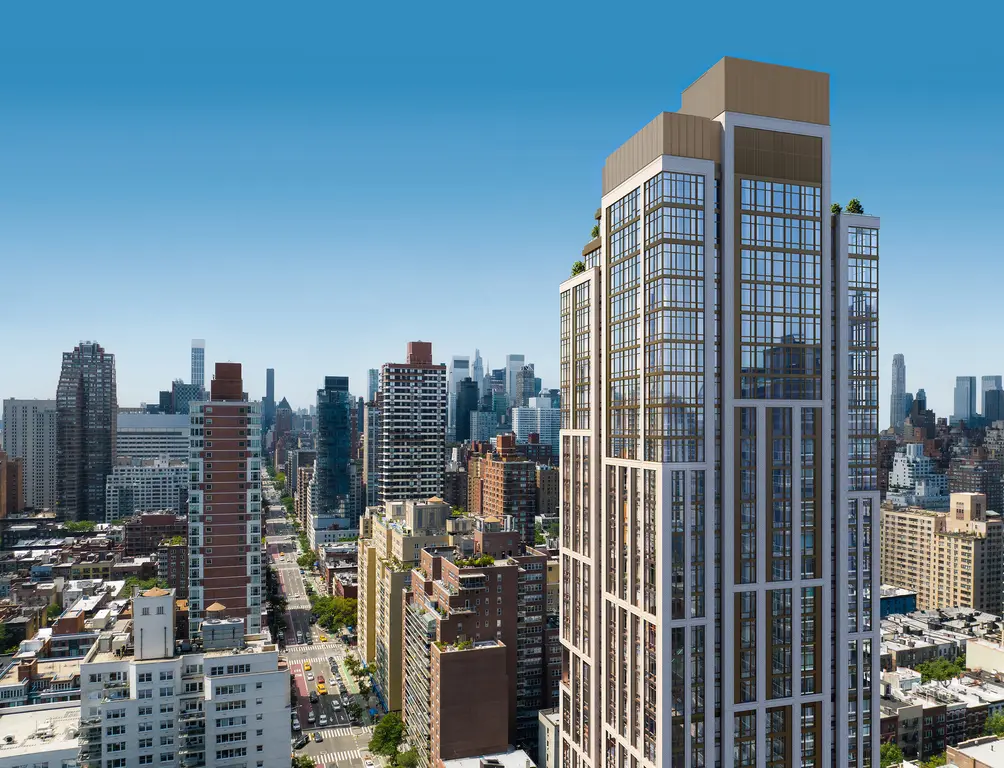 Maison 78, a newly launched rental on the Upper East Side (Nancy Packes Inc.)
Maison 78, a newly launched rental on the Upper East Side (Nancy Packes Inc.)
2. When does the lease start?
In many North American cities, people rent apartments one to two months in advance and moves only happen on the first day of the month. In New York City, this is rarely the case. Units are nearly always empty when they are rented, and management companies and even private landlords are typically eager to start leases immediately. This means that whether or not you’re ready to move, you may find yourself paying for an apartment as soon as the day after you sign the lease.
Before signing, clarify when the lease starts, and if you really can’t move in until the first of the month, attempt to negotiate. In some cases, you may be able to push back the lease date by at least a few days, if not until your desired start date. Assuming you’re working with a broker, ask them to intervene—this is precisely the sort of service you’re paying for when you work with a broker.
3. Are there any rules about who or what can occupy the unit with you?
From people to pets, it is important to know who and what can share your space. On the people side of the equation, you’ll need to list anyone living with you. If they are part of your immediate family (a spouse or child), it is unlikely you will experience any problems, but according to New York City’s Housing Maintenance Code (PDF), there are some restrictions. For example, the code states, “Every person occupying an apartment in a class A or class B multiple dwelling or in a tenant-occupied apartment in a one- or two-family dwelling shall have a livable area of not less than eighty square feet. The maximum number of persons who may occupy any such apartment shall be determined by dividing the total livable floor area of the apartment by eighty square feet. For every two persons who may lawfully occupy an apartment, one child under four may also reside therein.” Technically, this means that if you’ve flexed a 650-square-foot apartment into an apartment for a family of four, you still have a lot of room to spare. On the other hand, four adults bunking in a 300-square-foot studio are technically breaking the law.
While monitoring how many people are living in any given unit is something the city has not traditionally put much effort into policing, at the time of a lease signing, compliance is important.
As for pets, if you’re a renter, you may find yourself without many rights at all. Management companies and individual landlords can prohibit animals. Co-ops and condos are also free to make up their own rules about pets. This means that unless you have a service animal and the documentation to prove you need a service animal in your life, if you rent in a no-pet building or simply from an owner who would prefer to not accommodate pets, you’ll need to find a new home for your cat, dog, or iguana or you’ll need to look for housing elsewhere.
While monitoring how many people are living in any given unit is something the city has not traditionally put much effort into policing, at the time of a lease signing, compliance is important.
As for pets, if you’re a renter, you may find yourself without many rights at all. Management companies and individual landlords can prohibit animals. Co-ops and condos are also free to make up their own rules about pets. This means that unless you have a service animal and the documentation to prove you need a service animal in your life, if you rent in a no-pet building or simply from an owner who would prefer to not accommodate pets, you’ll need to find a new home for your cat, dog, or iguana or you’ll need to look for housing elsewhere.
4. How and when is rent paid?
A growing number of New York City management companies use some form of rental management software. These systems enable renters to pay their rent online anytime and generally allow for debit or credit card payments. Still, some management companies are doing things old-school style and simply send a notice with an expectation that a rent check will arrive by or before the first day of the new month. It is important to bear in mind that management companies that have not yet automated typically only accept checks received by mail. If you travel frequently for work and are not always able to write and mail a rent check in person, be certain to ask about payment options before signing a new lease.
5. Is renters insurance required?
While not required everywhere in North America, most New York City leases do ask renters to acquire renters insurance. Although it is unlikely that anyone will ever ask you for proof, bear in mind that if you don’t purchase a policy and something happens, you’ll be out of luck. Fortunately, unlike home insurance, renters insurance tends to cost only about $12 to $15 per month for a basic policy.
6. Can you modify your unit?
Before you start to dream about renovating your apartment, clarify what you can and cannot do and what you can do but only with the owner’s permission. This holds true for major renovations, including adding pressurized walls to create new rooms, and minor renovations, including painting projects.
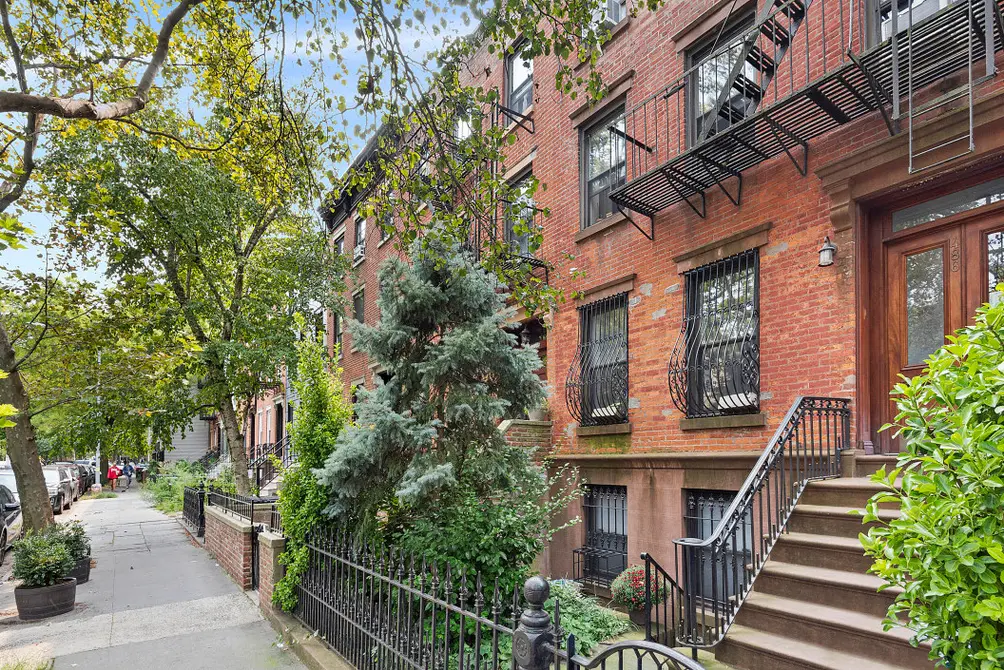 486 Warren Street (Compass)
486 Warren Street (Compass)
7. Who handles maintenance issues, including emergencies?
If you’re renting from an individual, you will likely deal directly with the owner when maintenance issues and emergencies arise. If you’re renting in a co-op, you may be asked to direct all concerns to your building’s superintendent or conversely to first contact your management company who in turns contacts your co-op’s superintendent to address the problem. In addition, your management company may have a different protocol for dealing with regular maintenance issues and emergencies. Whatever the protocol, ask in advance. If it is unclear who you can reach out to when faced with an emergency gas leak or plumbing disaster on a weekend or holiday, it is probably best to not sign a lease at all.
8. Are there laundry facilities in the building and if not, can you install a washer/dryer?
Before you move in, find out whether the building has laundry facilities and if not, whether you can install your own washer and/or dryer. While some owners are happy to let tenants install these appliances at their own cost and others will permit installations but only if you agree to use an installer of their choice, other owners prohibit installations under any circumstance. Usually, this reflects the fact that in older buildings, the flow of water from a washer can overwhelm the building’s plumbing capacity. If having laundry in your unit or at least in your building is a deal breaker, be certain to clarify access and installation terms before you finalize your lease.
9. What certificates or additional deposits are required to move in?
While subdivided homes and many smaller buildings have no regulations about when you can move in or out, if you’re moving into a co-op or condo, you’ll need a certificate of insurance. Essentially, this offers proof that your mover is insured and assures that any damage incurred during your move (e.g., a scratched elevator wall) will be covered by your mover. Notably, some co-ops will also ask for a small move-in deposit. This additional deposit, which usually ranges from $250 to $1,000, is also collected to ensure that the co-op can cover the cost of any damage incurred during your move. Although management companies are expected to inform tenants about move-in deposits in advance, it is a small detail often overlooked.
10. What is the lease renewal process?
Finally, before you commit to your new apartment, confirm that the lease can be renewed and ask about the process. Will you be sent a lease renewal with the option of declining or renewing and if so, at what time of year should you expect the renewal to arrive? The most important question to ask in New York City, however, is whether or not you’re signing a regular lease or a lease on a rent-stabilized apartment. To find out whether your unit is rent-stabilized, visit the New York City’s Rent Stabilized Building Lists site. Notably, on rare occasions, units that are rent-stabilized are rented at market rent, so it is always a good idea to clarify your unit’s status prior to signing. In the end, you may be able to rent your unit at a lower rate and moving forward, you’ll be protected from steep rental hikes whenever it is time to renew your lease.
Coming Soon
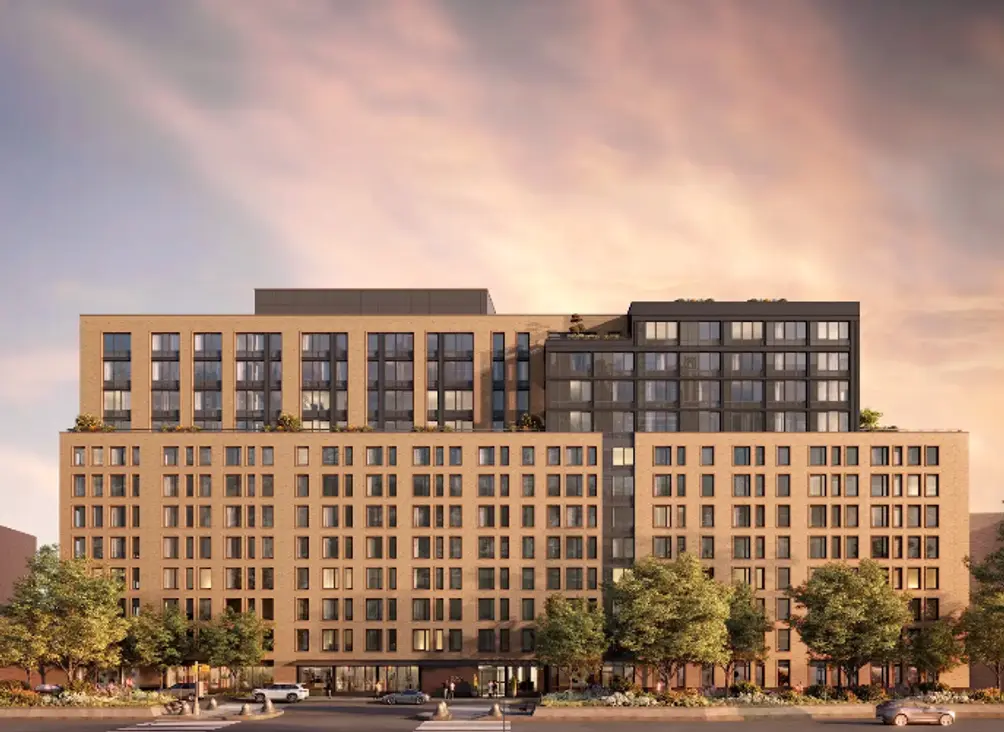 The Houston (Real New York)
The Houston (Real New York)
With its brick facade, oversized windows, and eighth-floor setback, The Houston pays respectful tribute to historical architecture on the Lower East Side. However, amenities like in-unit laundry, an indoor/outdoor fitness center, a coworking library lounge, and a rooftop terrace were designed to appeal to contemporary renters. An affordable lottery is underway until May 27, 2025, and market-rate leasing is expected to commence this spring.
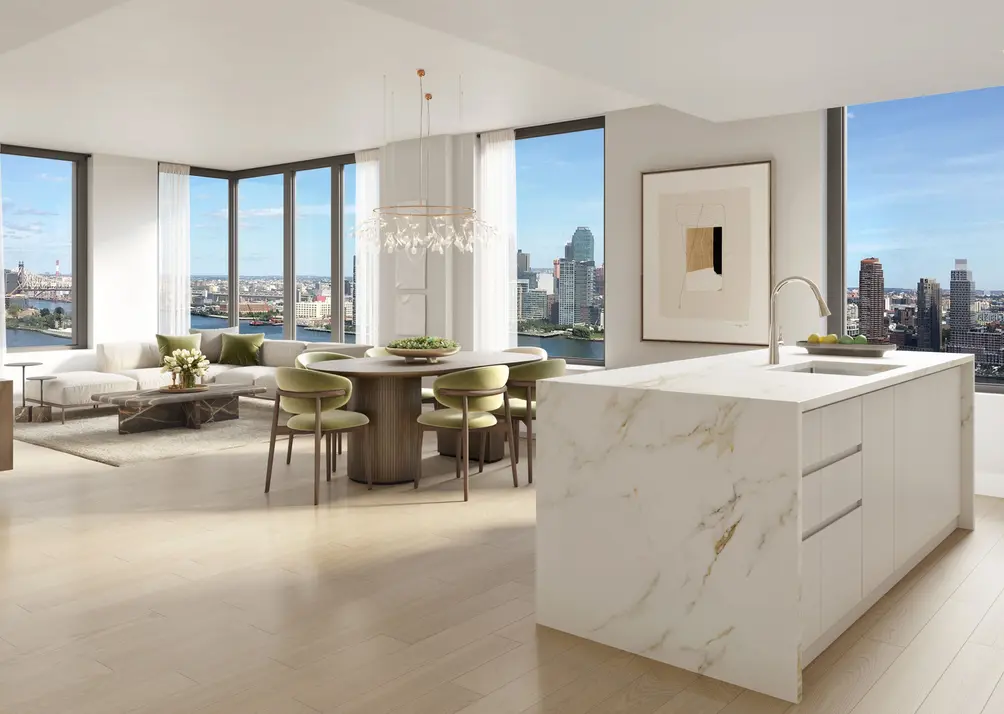 (The East)
(The East)

A stone's throw from StuyTown, The East is gearing up for a leasing launch later this year. The mixed-income tower is set to feature apartments with East River views and high-end finishes throughout, and amenities will include a fitness center, a lounge, and a roof deck with panoramic views.
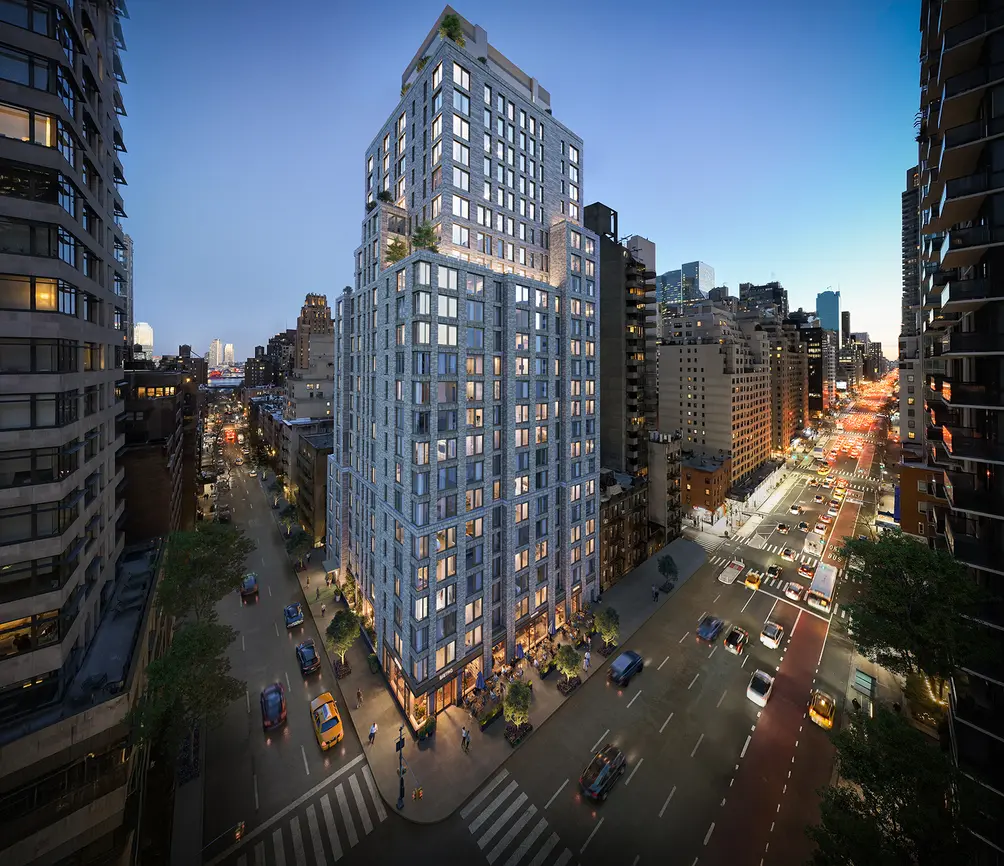 Anagram Turtle Bay (MAG Partners)
Anagram Turtle Bay (MAG Partners)
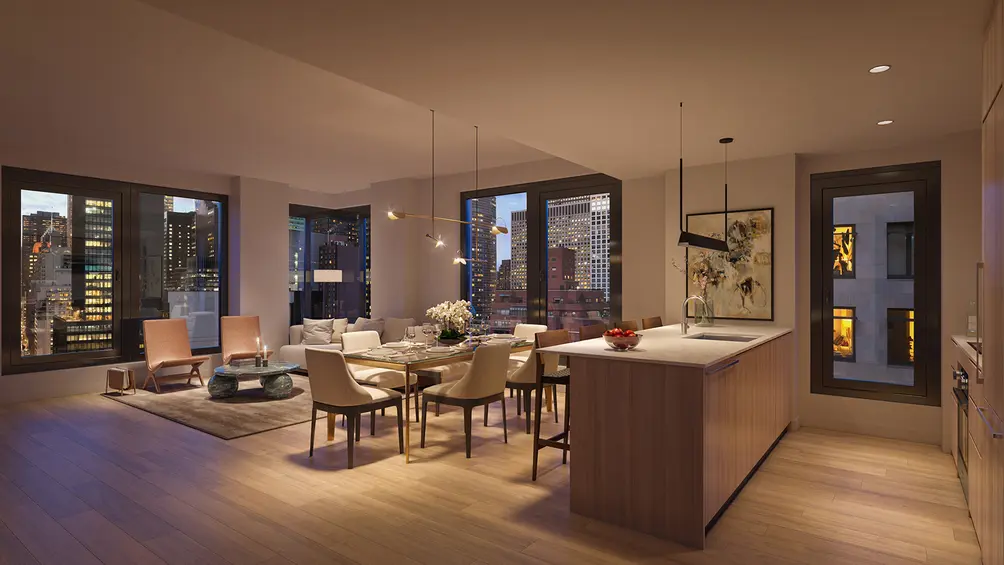
In May 2024, two buildings developed by MaryAnne Gilmartin's MAG Partners topped out on the same day. Less than a year later, both buildings reached similar milestones at the same time again: Shortly after new renderings were revealed of Chelsea rental Mabel, new renderings were revealed for Anagram Turtle Bay.
Anagram Turtle Bay's 194 units will start on top of retail space; and, as footings were laid just before the 421a tax abatement program expired in June 2022, the building qualified for tax benefits and set aside 30% of units as affordable housing. Interior renderings show oversized windows and high-end finishes, and amenities are set to include a fitness center, a lounge, a bike room, a courtyard, and a roof deck.
Anagram Turtle Bay's 194 units will start on top of retail space; and, as footings were laid just before the 421a tax abatement program expired in June 2022, the building qualified for tax benefits and set aside 30% of units as affordable housing. Interior renderings show oversized windows and high-end finishes, and amenities are set to include a fitness center, a lounge, a bike room, a courtyard, and a roof deck.
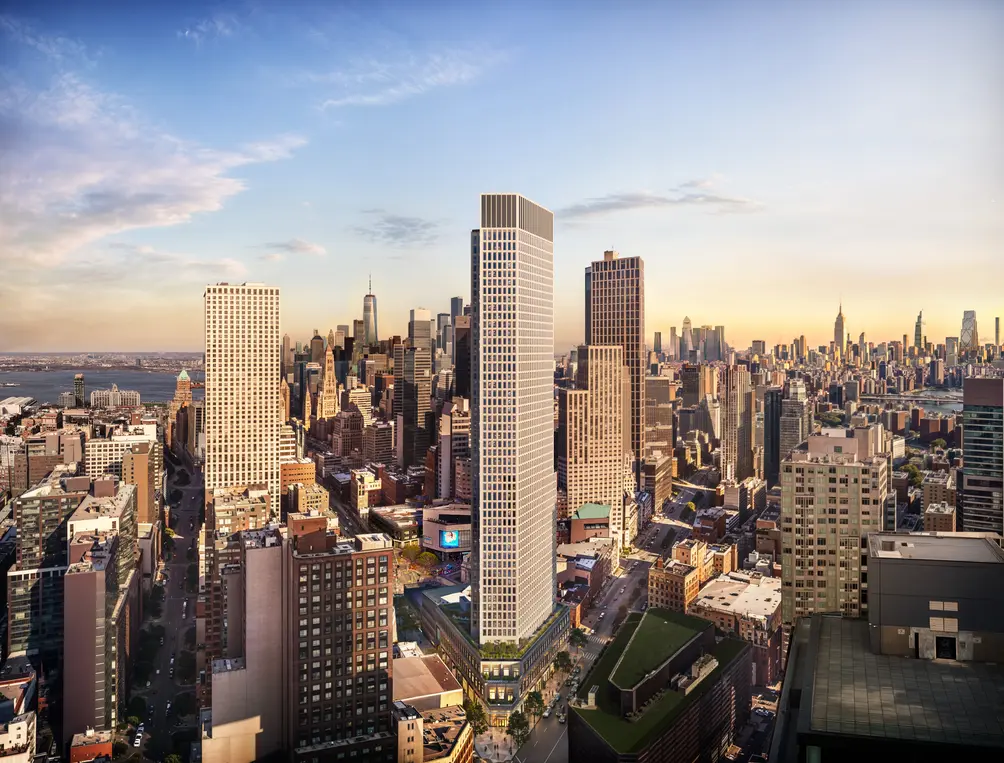 The Brook (Nancy Packes Inc.)
The Brook (Nancy Packes Inc.)


A leasing launch is on the horizon for The Brook, one of the latest additions to the Downtown Brooklyn skyline and one boasting a striking design by Beyer Blinder Belle. The building has designated 30% of the forthcoming units as affordable, and all units will feature oversized windows and interiors by Bonetti Kozerski Architecture. Approximately 30,000 square feet of indoor and outdoor amenities are set to include a fitness center with yoga/group fitness room, an indoor basketball and pickleball court, a coworking lounge, an activity lounge with bar, a game room, a children's playroom, an outdoor pool with cabanas and loungers, and a Sky Lounge and outdoor dining terrace with Manhattan skyline views.
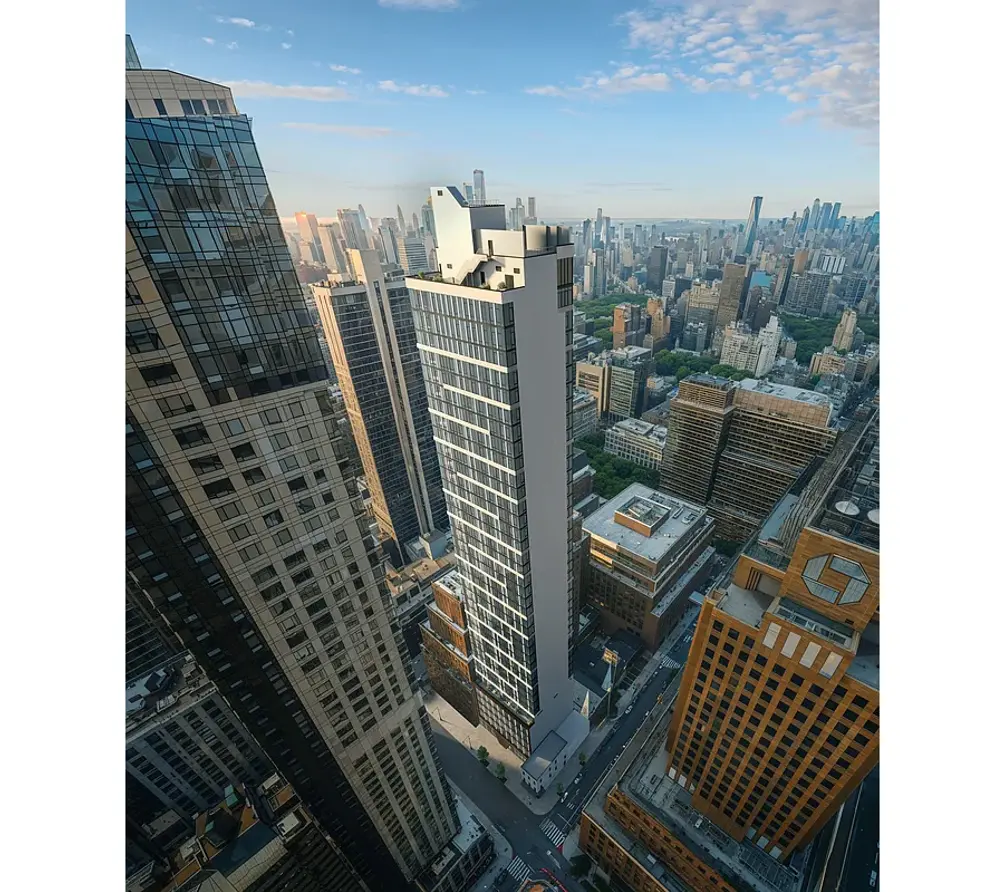 Maxwell Downtown (Corcoran Group)
Maxwell Downtown (Corcoran Group)
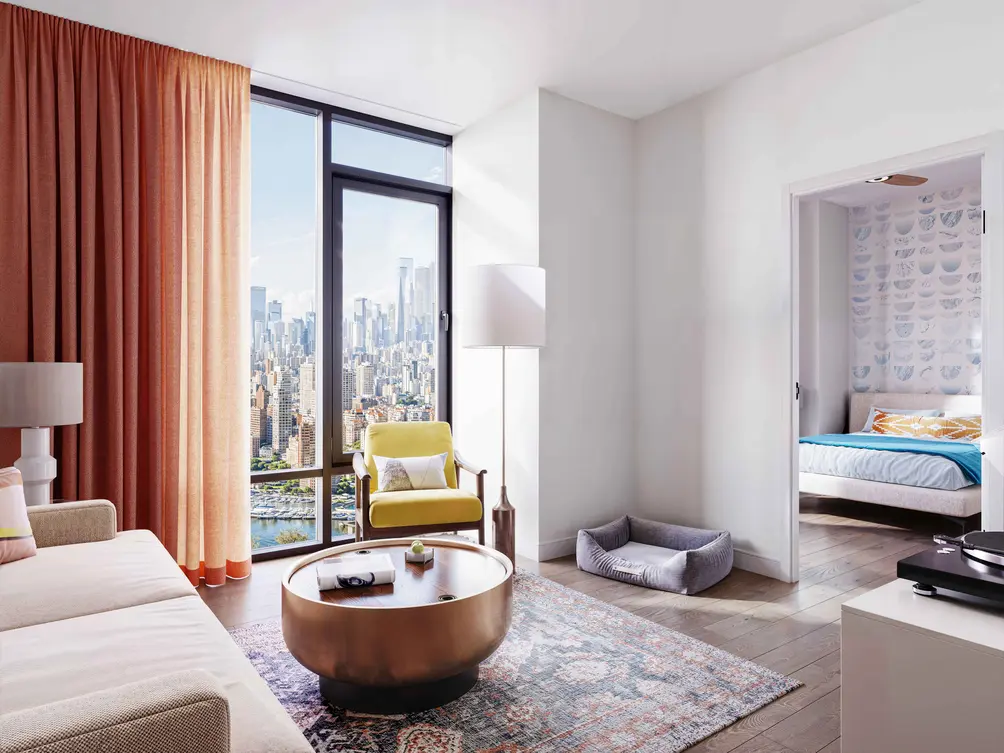

Downtown Brooklyn has seen an incredible residential renaissance in recent years, and Maxwell Downtown is its latest entrant. The design by GF55 Architects is distinguished by white horizontal bars set against a sleek glass curtain wall, which promises incredible light and views for apartments starting on the sixth floor. Amenities include a fitness center with yoga studio and terrace access, a 40th-floor club room with coworking and lounge areas, a rooftop dog run, and a roof terrace with grilling, dining, and lounging areas.
Now Leasing
 The Maybury (Gotham Organization)
The Maybury (Gotham Organization)


When The Maybury was still on the drawing board, Community Board 4 specifically requested that it “avoid looking like a dystopian glass box.” Years later, its rust-red paneled facade by Handel Architect sets it apart in the Hudson Yards/Far West Side skyline.
All units feature expansive windows, energy-efficient appliances, and high-end finishes throughout. The Abode by Gotham collection of micro-residences comes with built-in Murphy beds that transform into sofas or desks. Approximately 20,000 square feet of indoor and outdoor amenities include a fitness center and adjacent yoga studio, a coworking lounge, a cocktail lounge, an eighth-story terrace with grills, and a roof terrace with wet bar and lounge areas.
All units feature expansive windows, energy-efficient appliances, and high-end finishes throughout. The Abode by Gotham collection of micro-residences comes with built-in Murphy beds that transform into sofas or desks. Approximately 20,000 square feet of indoor and outdoor amenities include a fitness center and adjacent yoga studio, a coworking lounge, a cocktail lounge, an eighth-story terrace with grills, and a roof terrace with wet bar and lounge areas.
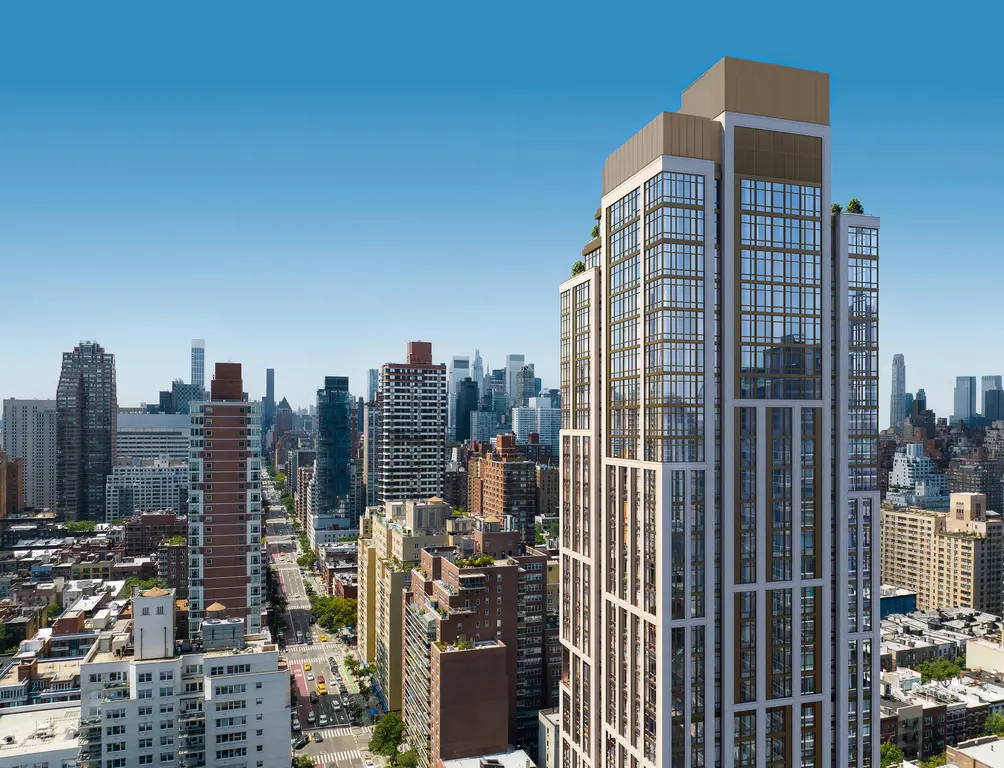 Maison 78 (Nancy Packes Inc.)
Maison 78 (Nancy Packes Inc.)
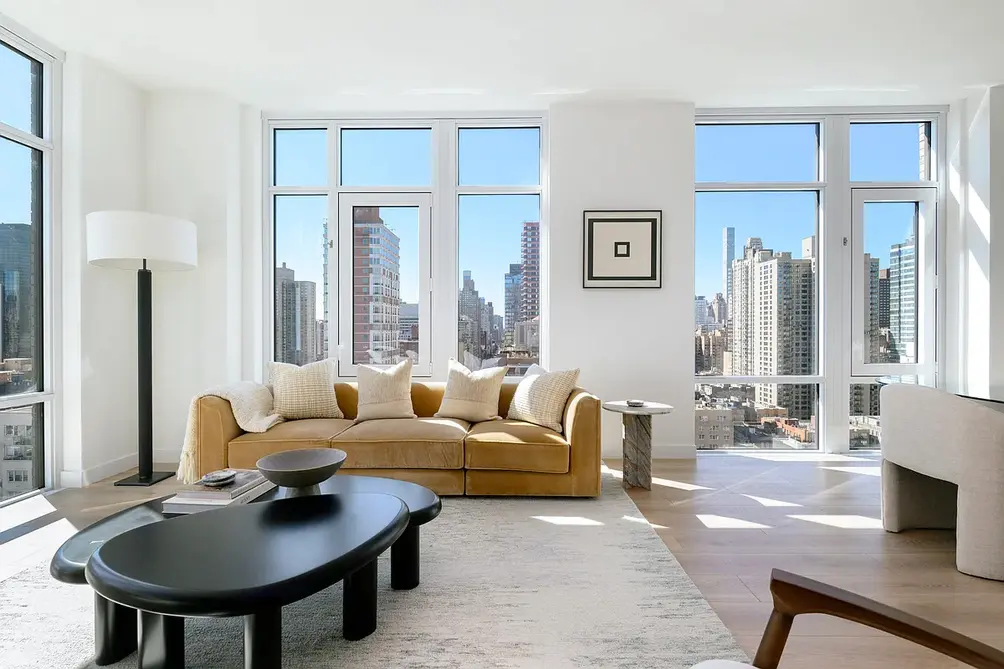
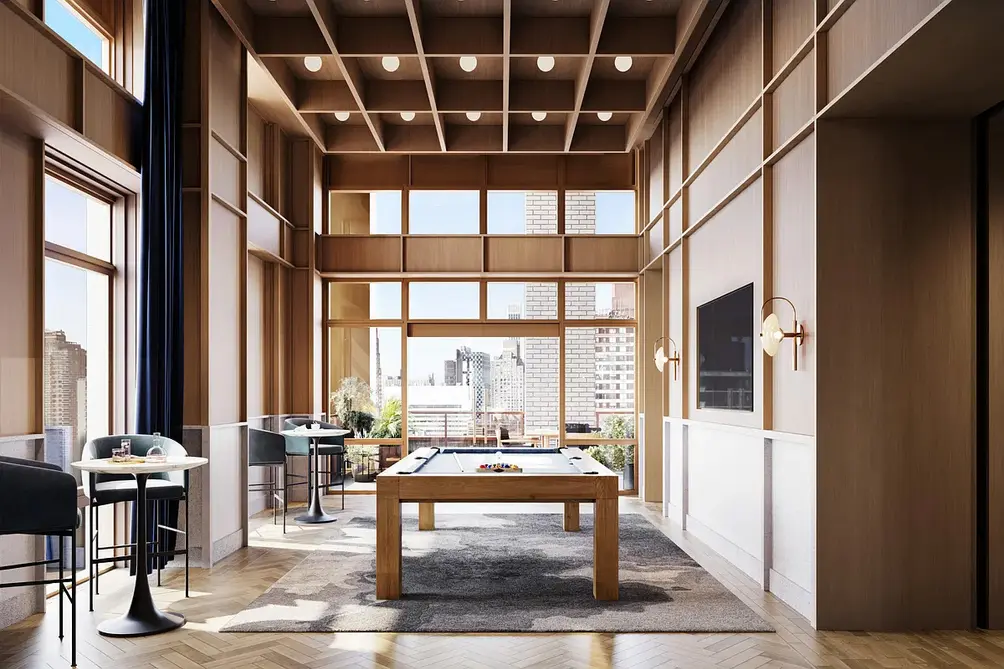
The Upper East Side's building boomlet mostly includes new condominiums, but new rentals like Maison 78 have also risen. All interiors feature oversized windows, high-end finishes and appliances, smart thermostats, and in-unit laundry. Residents arrive to an attended lobby, and amenities include a fitness center with yoga studio, a lounge with dining room and catering kitchen, a game room, a coworking lounge, a party room, and a roof terrace.
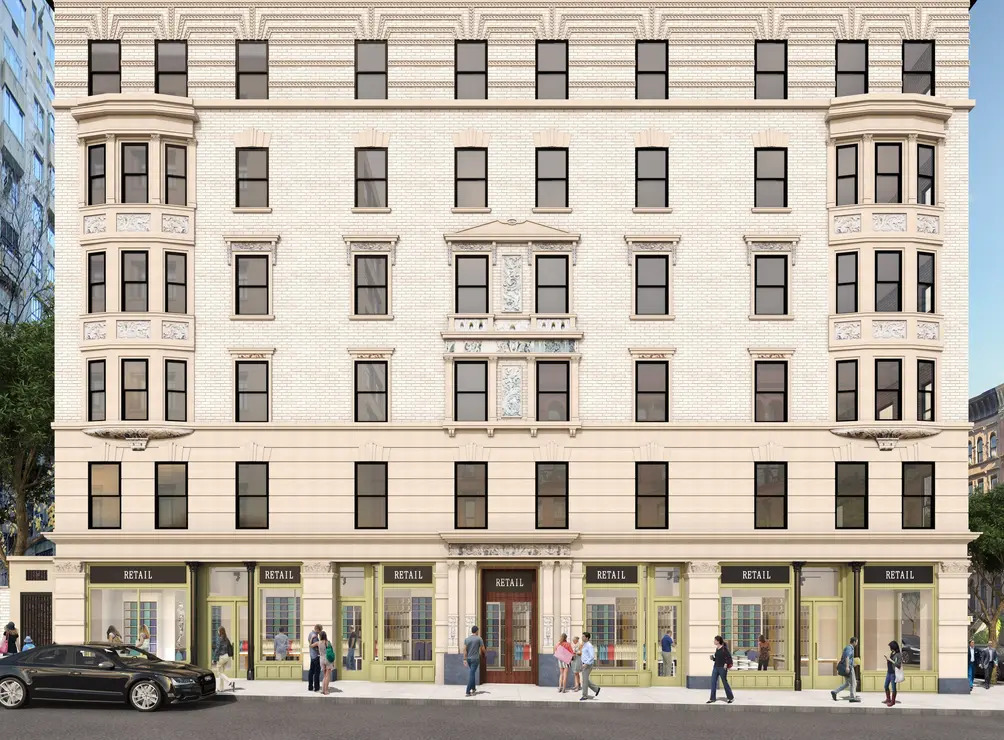 The Wellington (Corcoran New Development)
The Wellington (Corcoran New Development)

Over 125 years after it was originally constructed, The Wellington has been restored to its original glory amidst a conversion to a boutique rental. All 10 half- to full-floor units boast soaring ceilings, white oak hardwood floors, kitchens with quartz countertops and Miele appliances, baths with marble tile, and in-unit laundry. Amenities and perks include an attended lobby, a fitness room, a rooftop terrace with grilling and entertaining areas, and a prime Upper East Side address near Central Park, Museum Mile, 92NY, and acclaimed shopping and restaurants.
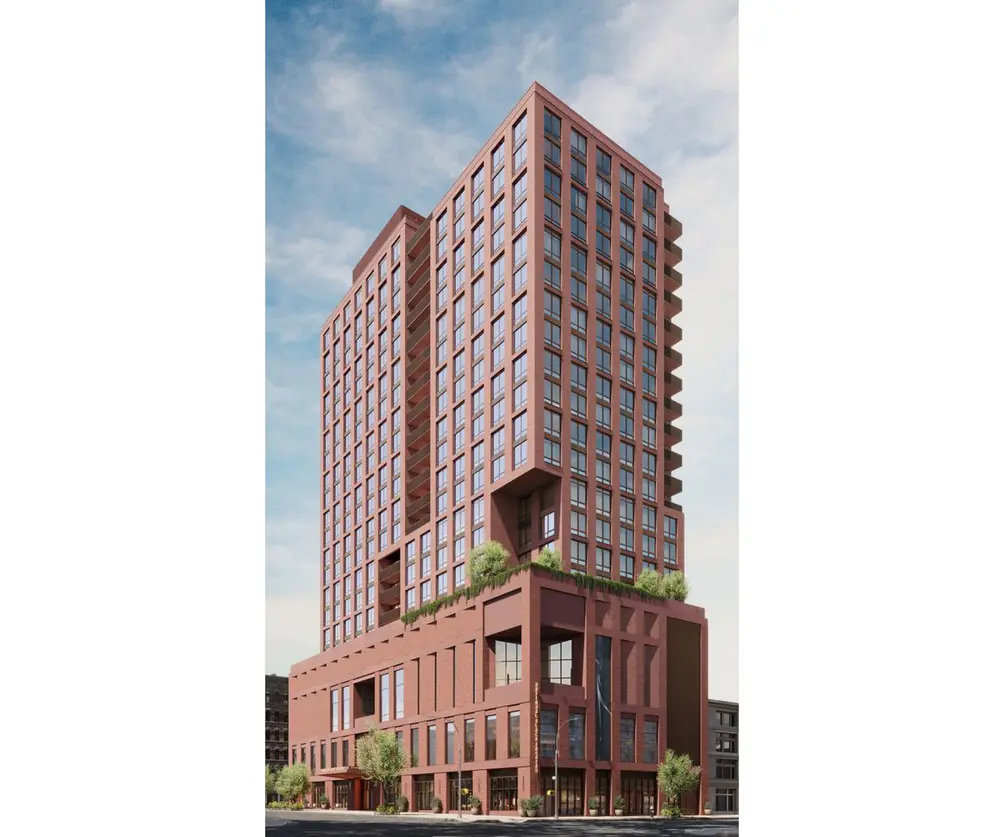 Ray Harlem (Compass)
Ray Harlem (Compass)
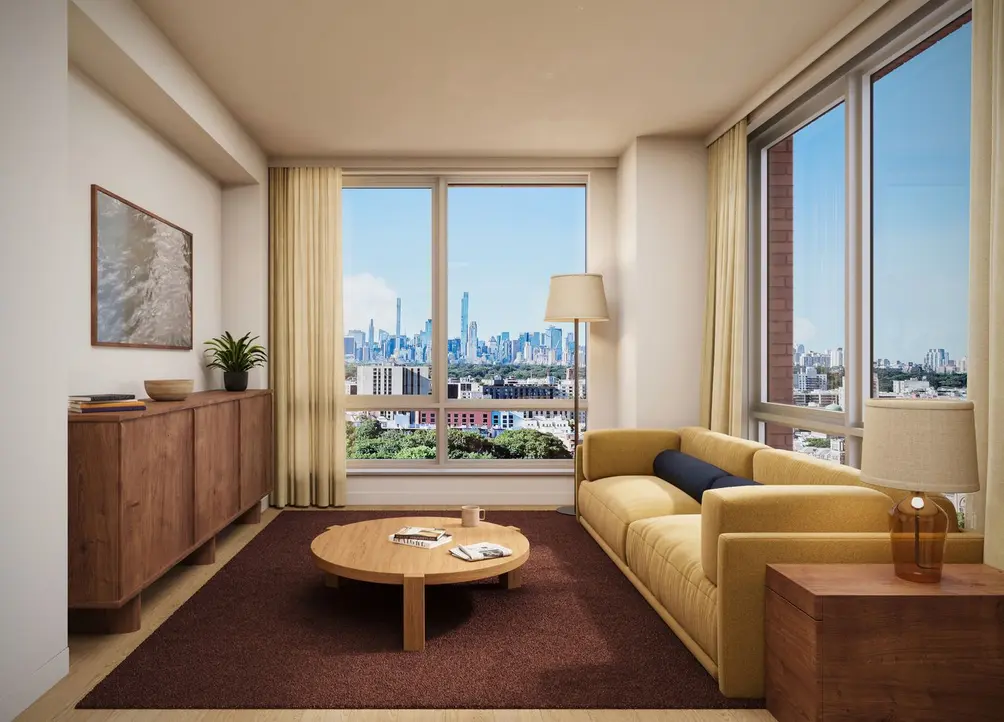
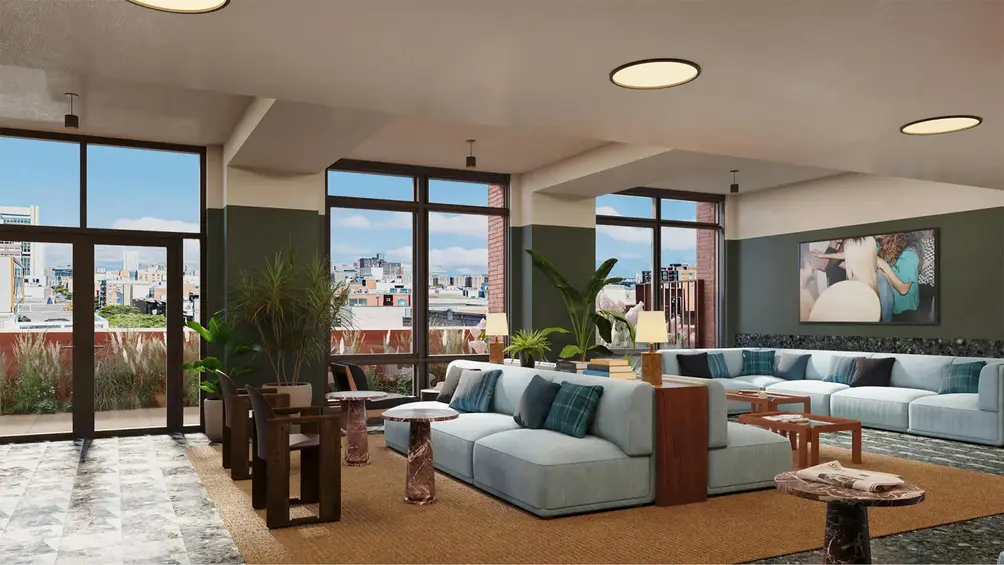
At Ray Harlem, a striking new building designed by Frida Escobedo, the apartments start on top of a new, permanent, state-of-the-art home for National Black Theatre. An affordable lottery took place earlier this winter, and leasing has recently launched on studio through two-bedrooms with oversized windows, blond oak floors, thoughtful finishes, smart thermostats, and in-unit laundry. Residents have access to a fitness center with yoga studio, a coworking lounge, a library curated by Phaidon Press, outdoor terraces on the fifth and 22nd floors, and the Living Room lounge.
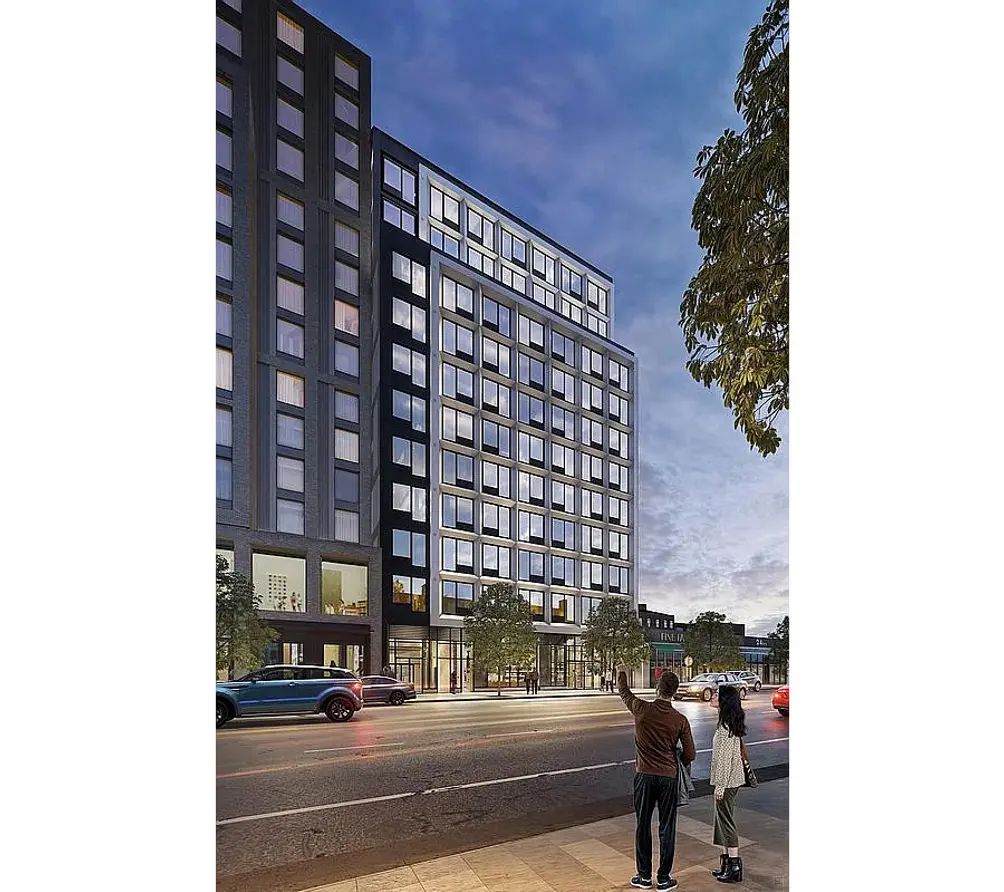 Tryon North (Bohemia Realty Group)
Tryon North (Bohemia Realty Group)
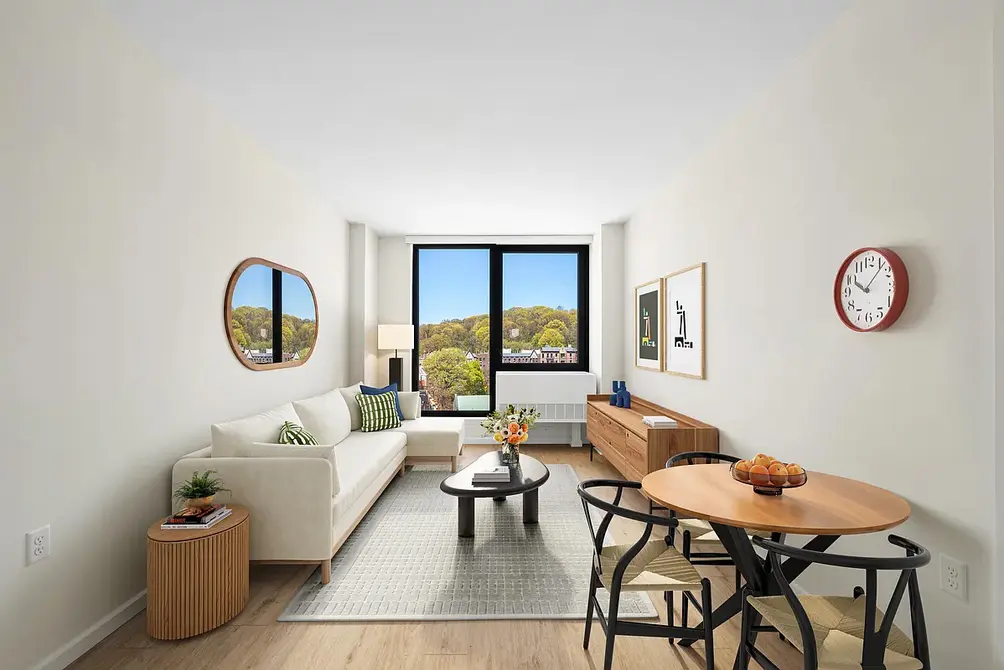
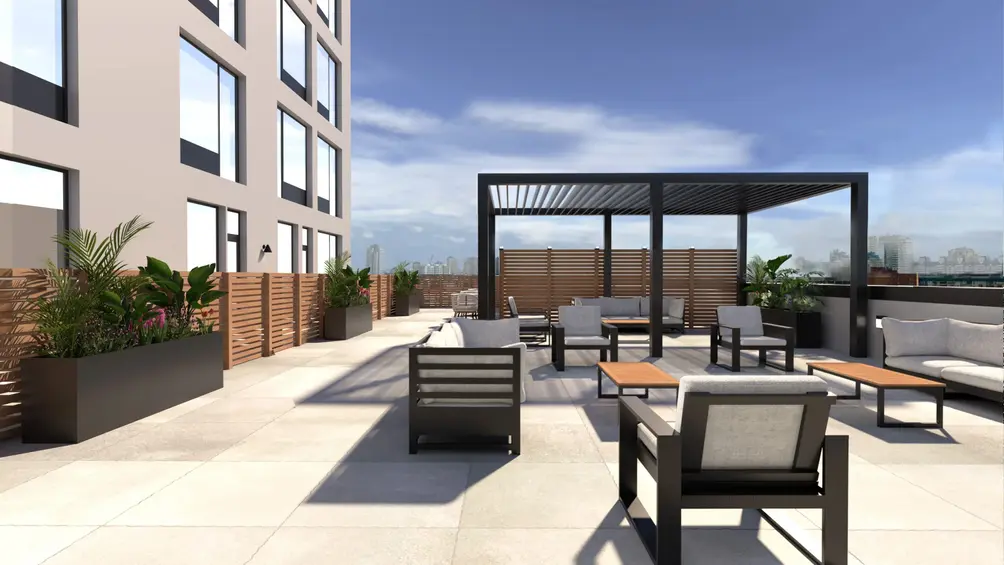
Following an affordable housing lottery earlier this winter, market-rate leasing is underway at Tryon North. All interiors feature oversized windows, high ceilings, blond wood floors, and modern kitchens with Caesarstone countertops and stainless steel appliances.
The building is located at the northern end of Fort Tryon Park and in close proximity to Inwood Hill Park, but residents of Tryon North enjoy a private outdoor terrace with multiple seating areas and a pergola. Indoor amenities and conveniences include a fitness center, a laundry room, bike storage, and a package room.
The building is located at the northern end of Fort Tryon Park and in close proximity to Inwood Hill Park, but residents of Tryon North enjoy a private outdoor terrace with multiple seating areas and a pergola. Indoor amenities and conveniences include a fitness center, a laundry room, bike storage, and a package room.
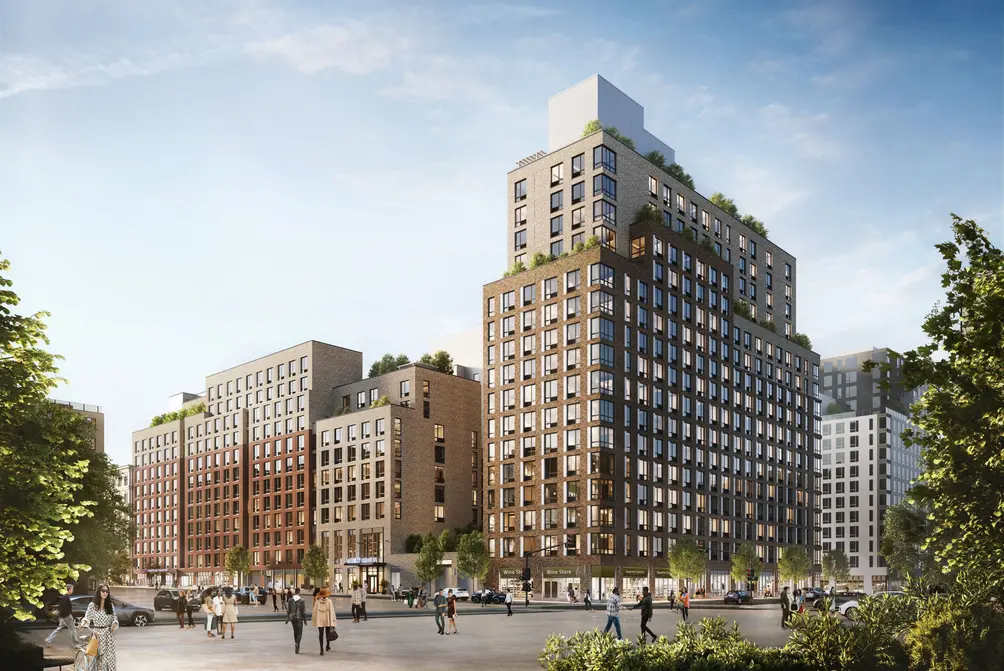 Miramar (Corcoran Group)
Miramar (Corcoran Group)


At the sprawling Miramar development, the apartments start on top of the People’s Theatre: Centro Cultural Inmigrante, a 19,000-square-foot performing arts center for Manhattan's largest performing arts organization north of Harlem. All interiors feature floor-to-ceiling windows with complimentary roller shades, open-plan layouts, kitchens with high-end finishes and LG stainless steel appliances, beautifully appointed baths, central heating and cooling, and LG washer/dryer with heat pump technology. Approximately 85,000 square feet of amenities include a state-of-the-art fitness center with yoga studio, a coworking lounge, a billiards/game room, a multi-sport simulator, two party rooms with wet bars, a karaoke lounge, a music room, two landscaped courtyard gardens, and a rooftop terrace with grills, dining and lounge areas, and views of the Manhattan skyline.
 The Rocklyn (Bushburg)
The Rocklyn (Bushburg)
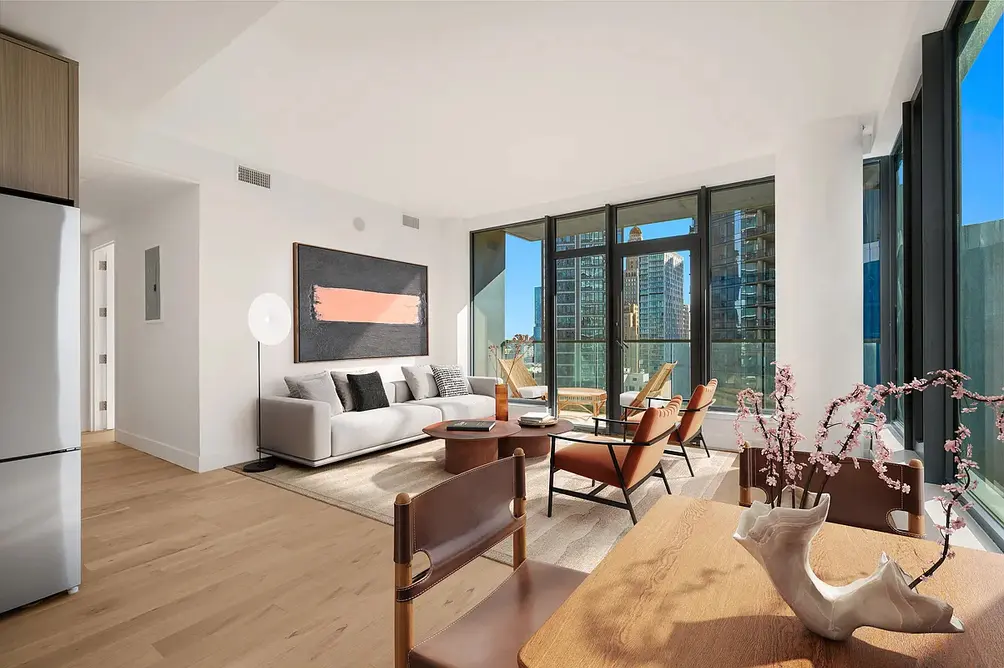

A short distance from the forthcoming Maxwell Downtown (see above) and a stone's throw from the LIU Brooklyn campus, leasing is underway at The Rocklyn. All studio to two-bedroom units feature interiors by Durukan Design, floor-to-ceiling windows, European white oak floors, kitchens with stainless steel appliances, baths with backlit LED mirrors, and in-unit laundry.
The Rocklyn is located in close proximity to an array of subway lines that promise an easy commute almost anywhere in Manhattan and Brooklyn. But with amenities like a fitness center, a spa, a bowling alley, a karaoke lounge, a coworking lounge, a party room, and a rooftop terrace, leaving the building might feel optional.
The Rocklyn is located in close proximity to an array of subway lines that promise an easy commute almost anywhere in Manhattan and Brooklyn. But with amenities like a fitness center, a spa, a bowling alley, a karaoke lounge, a coworking lounge, a party room, and a rooftop terrace, leaving the building might feel optional.
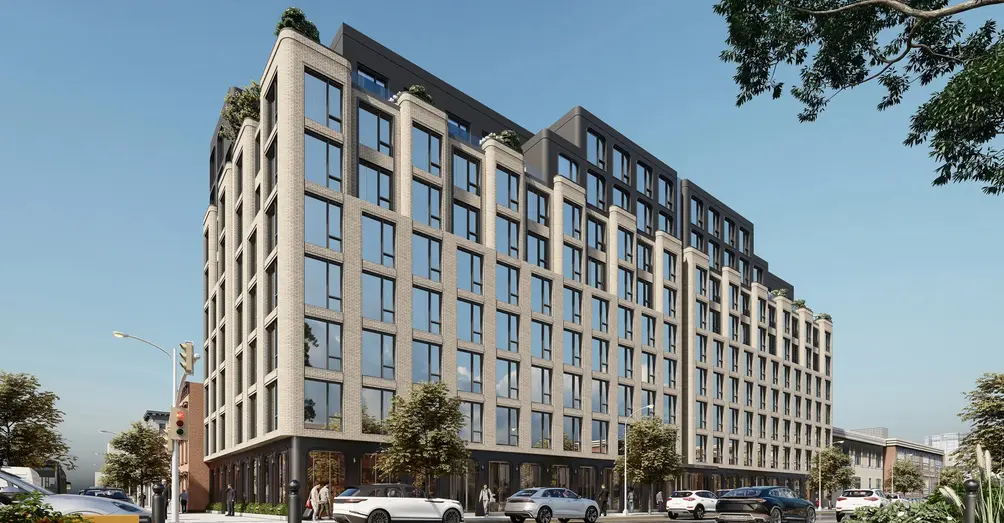 Prospect House (Bond New York)
Prospect House (Bond New York)


Prospect House offers a contemporary take on its historic surroundings with its low-rise height and two-toned facade. All interiors feature oversized windows, modern kitchens with Energy Star appliances, generous storage space, and in-unit laundry.
Amenities at Prospect House include a double-height lobby, a coworking lounge with private work areas, a fitness center, a sprawling courtyard, and a roof terrace with Manhattan skyline views. Another perk is an address near Prospect Park, the Brooklyn Museum, Franklin Avenue dining, and local transportation.
Amenities at Prospect House include a double-height lobby, a coworking lounge with private work areas, a fitness center, a sprawling courtyard, and a roof terrace with Manhattan skyline views. Another perk is an address near Prospect Park, the Brooklyn Museum, Franklin Avenue dining, and local transportation.
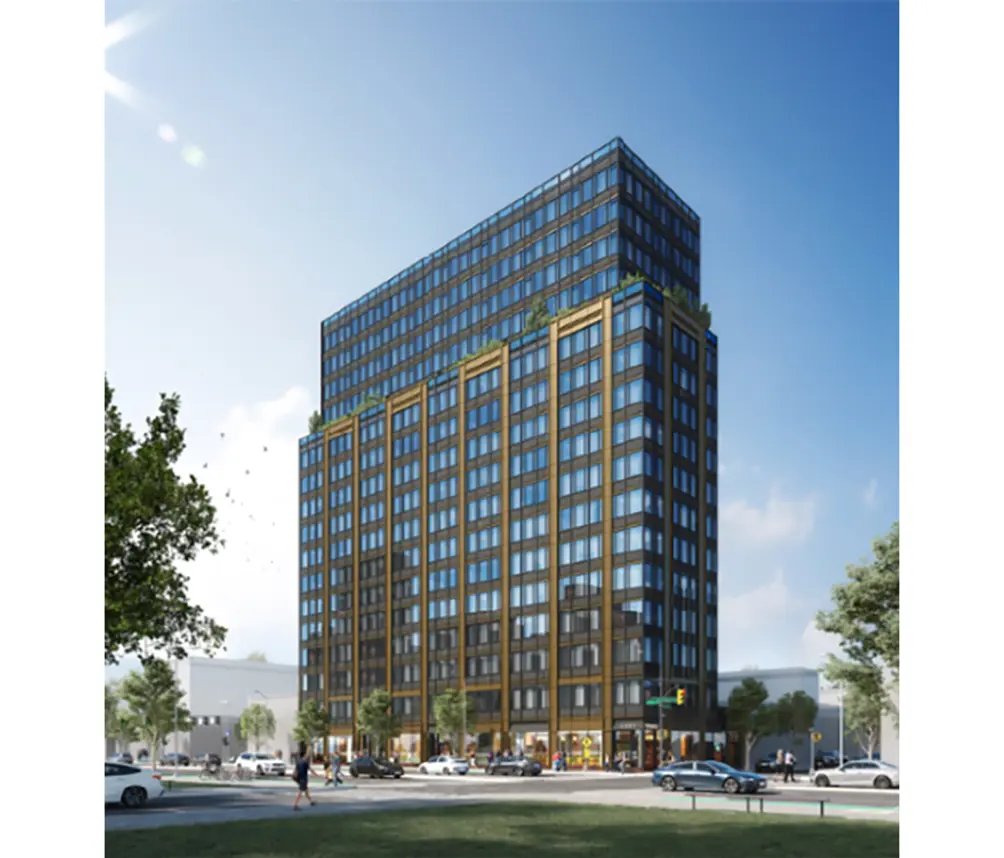 336 Douglass (Nancy Packes Inc.)
336 Douglass (Nancy Packes Inc.)
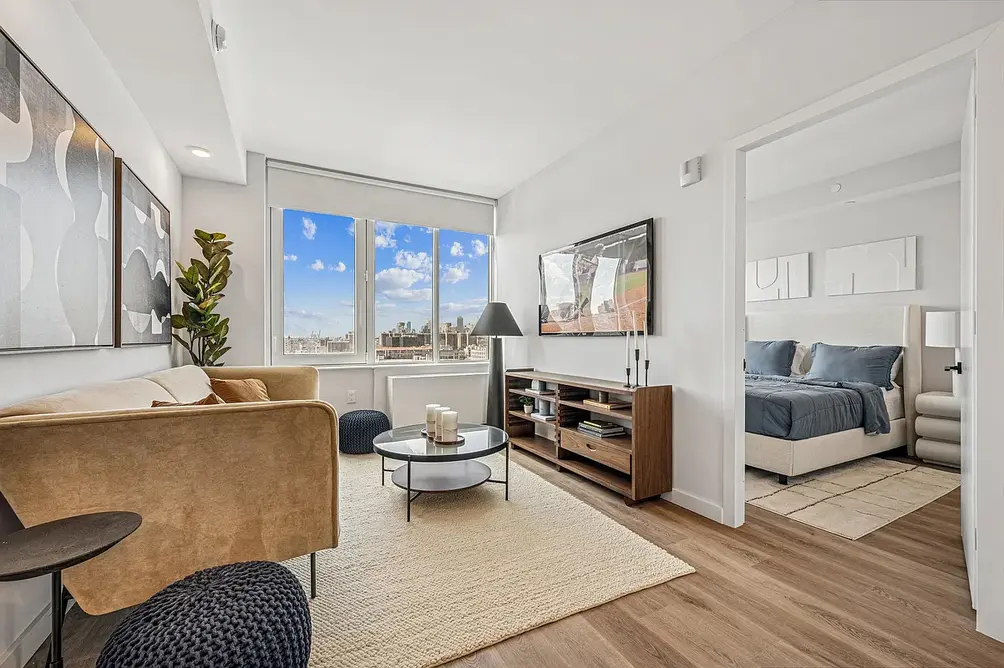

336 Douglass, which spans almost the entire block of 4th Avenue between Douglass and Degraw Streets, rose on the former site of a gas station in Gowanus. All interiors feature oversized windows, high-end appliances and finishes, kitchens with dishwashers and electric stoves, in-unit laundry, and central heating and air conditioning. Select units have private outdoor space, and all residents have access to the building's fitness center, basketball/squash court, music room, coworking lounge, game room, sun deck, and roof terrace with grilling stations and private cabanas.
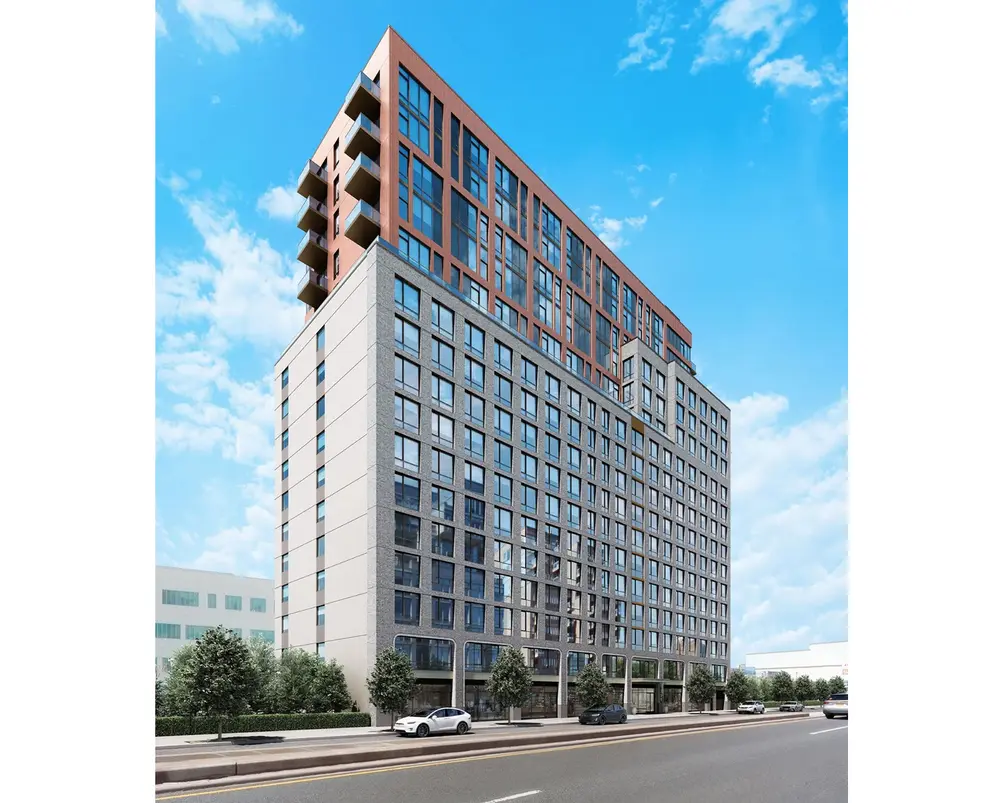 Longview (Corcoran Group)
Longview (Corcoran Group)
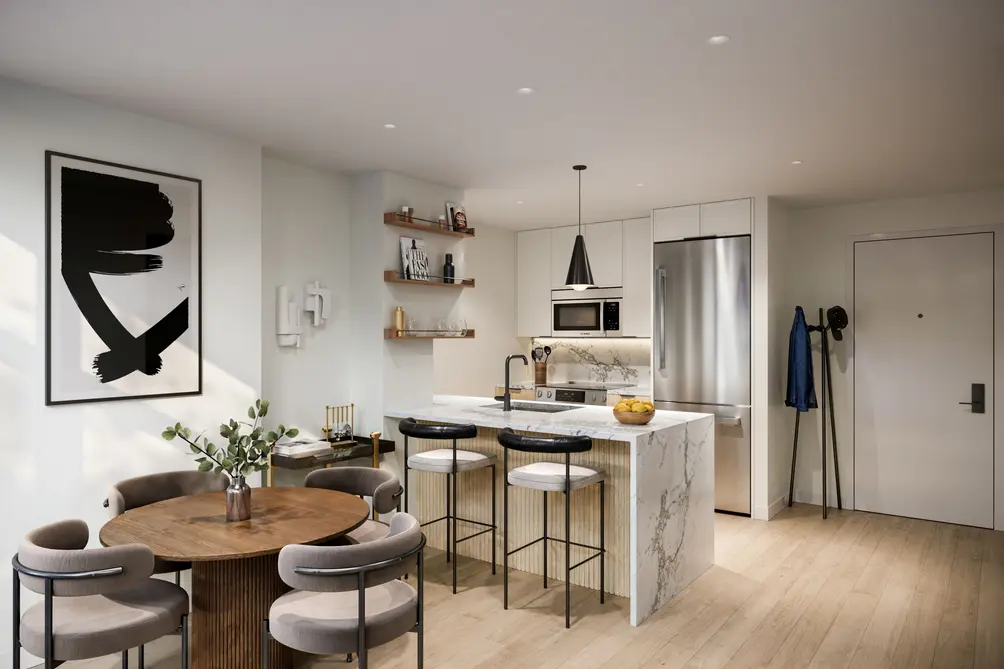

Longview is located at the nexus of Park Slope and Gowanus, and its design by GF55 nods to both neighborhoods' architecture. The building houses 197 one- and two-bedroom units, all of which feature oversized windows, high ceilings, hardwood floors, stylish kitchens and baths, and in-unit laundry. Amenities include an attended lobby, an indoor/outdoor fitness center, a sports simulator, a game room, a 15th-story terrace, and a roof terrace with gas grills, wet bar, and Manhattan skyline views.
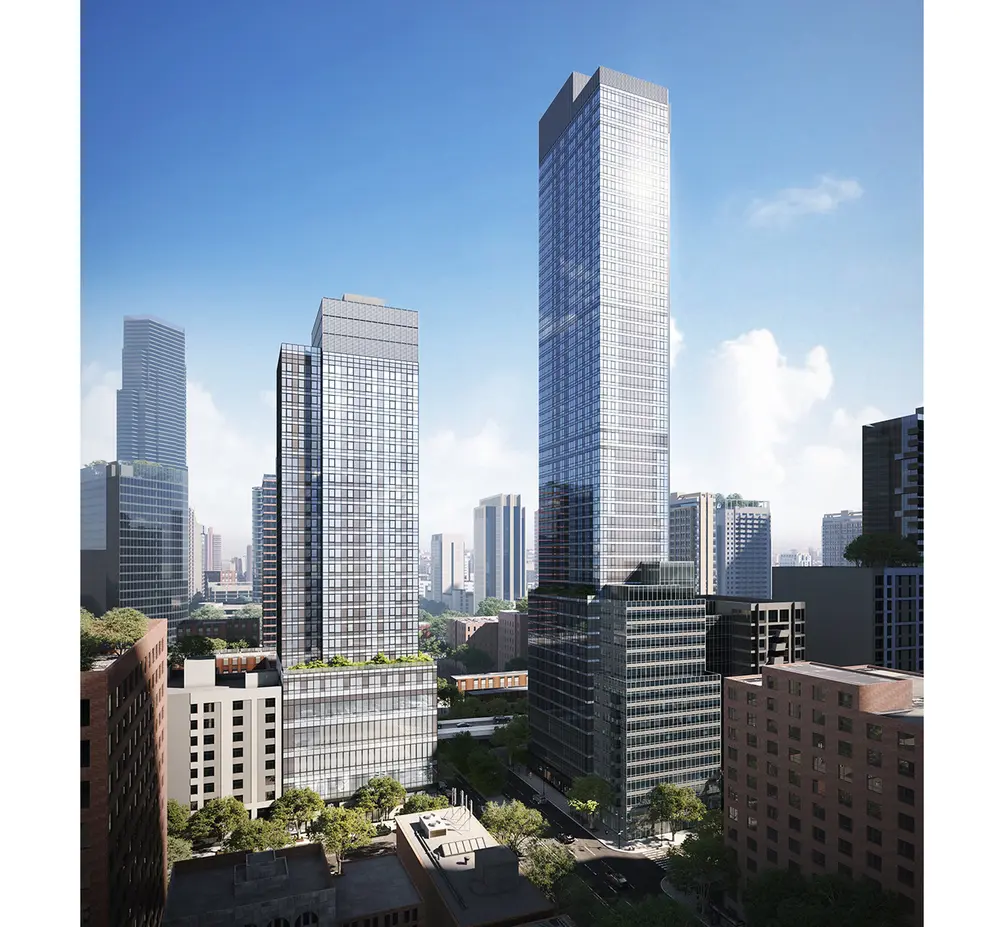 The Italic (r; Fetner)
The Italic (r; Fetner)
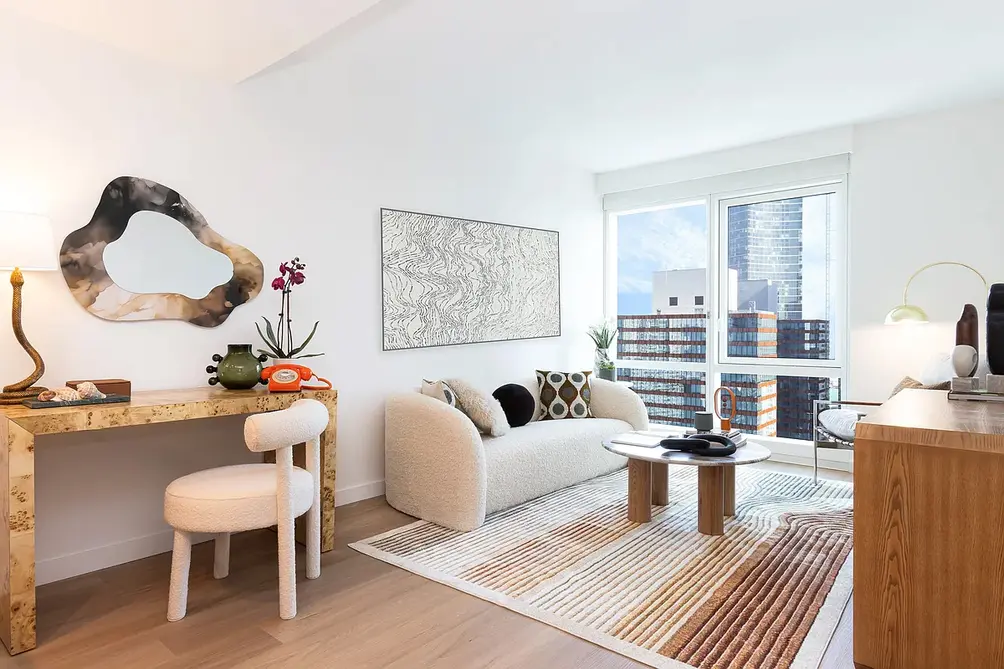

The Bold and The Italic, a twin-towered development in the Court Square section of Long Island City, has risen on the former site of a gas station. The Bold has reached 100% occupancy, and leasing is underway at The Italic. Residents of both buildings can access each other's amenities, which include fitness centers, an indoor basketball court, golf simulators, coworking lounges, pet wash stations, a state-of-the-art demonstration kitchen, and a rooftop terrace with 360-degree views of the Manhattan skyline.
 Pearl House (Gensler)
Pearl House (Gensler)
 Pearl House amenities (Compass)
Pearl House amenities (Compass)
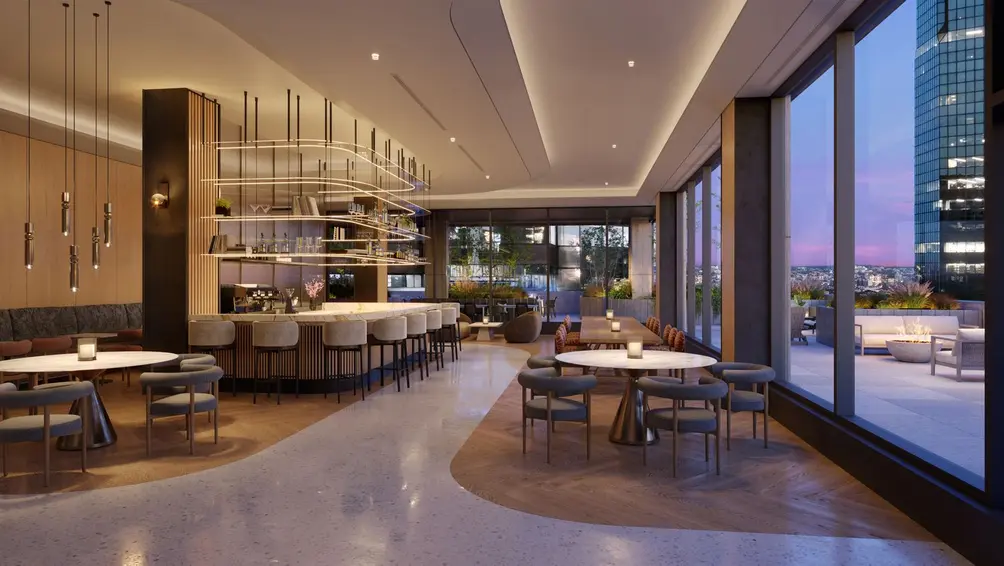
About 50 years after 160 Water Street was constructed as an office, it has reopened its doors as Pearl House, a highly anticipated office-to-residential conversion a stone's throw from the resurgent Seaport. The residences feature oversized, newly operable windows, designer kitchens, spa-inspired baths, in-unit laundry, and smart home technology. An extensive amenity suite includes a fireside lounge, a fitness center, a children's playroom, a bowling alley and game room, a high-tech sports simulator, and a full-floor Sky House with terrace access.
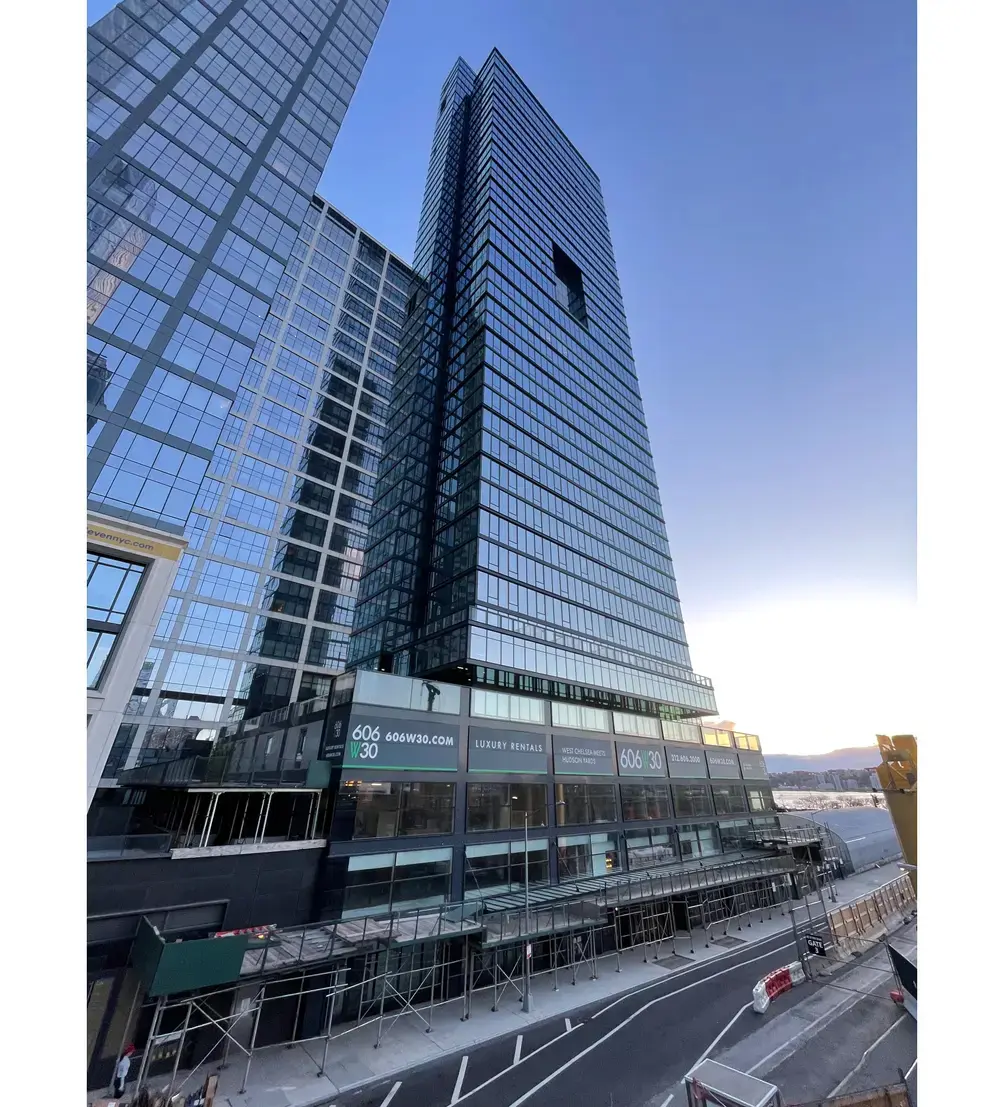 606 West 30th Street (CityRealty)
606 West 30th Street (CityRealty)
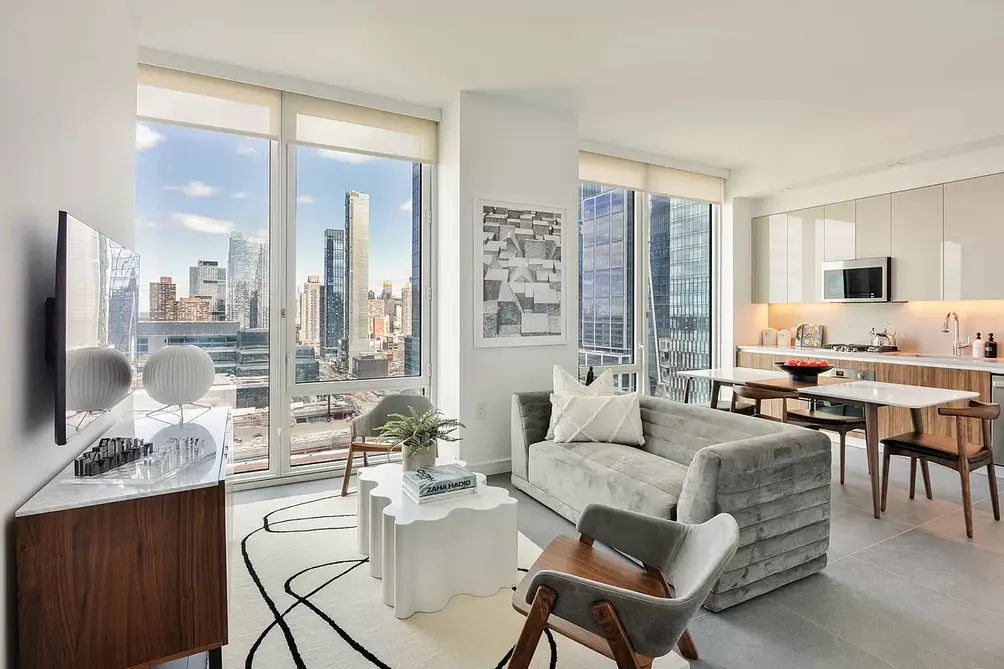 Apartment interiors (Lalezarian Properties)
Apartment interiors (Lalezarian Properties)

Located where West Chelsea meets Hudson Yards, this rental tower strikes an elegant pose with its staggered slab form, svelte profile, private balconies, and distinctive multi-story loggias notched within the glass facade. An array of amenities includes an indoor pool and sauna, a fitness center, multiple lounges, a children's playroom, bike storage, on-site valet parking, and a roof deck with big-screen TV, BBQ grills, and spectacular city views.
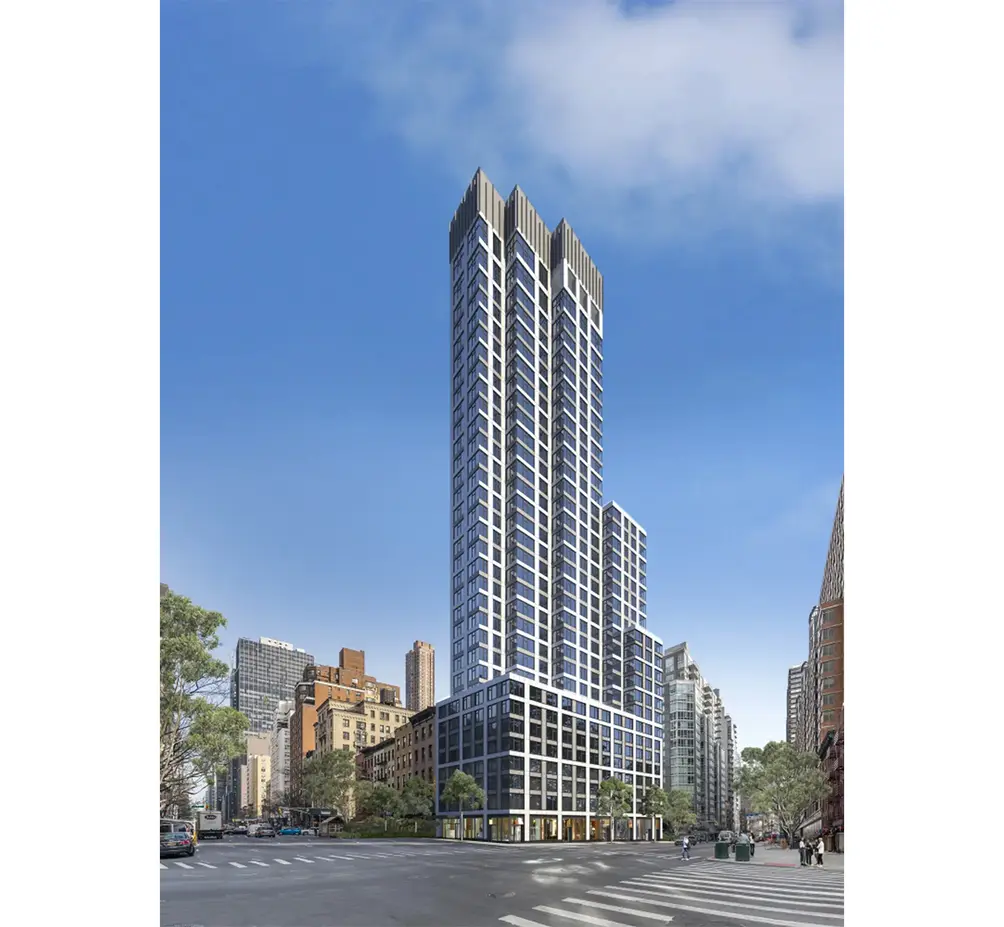 The Murray (Corcoran Group)
The Murray (Corcoran Group)

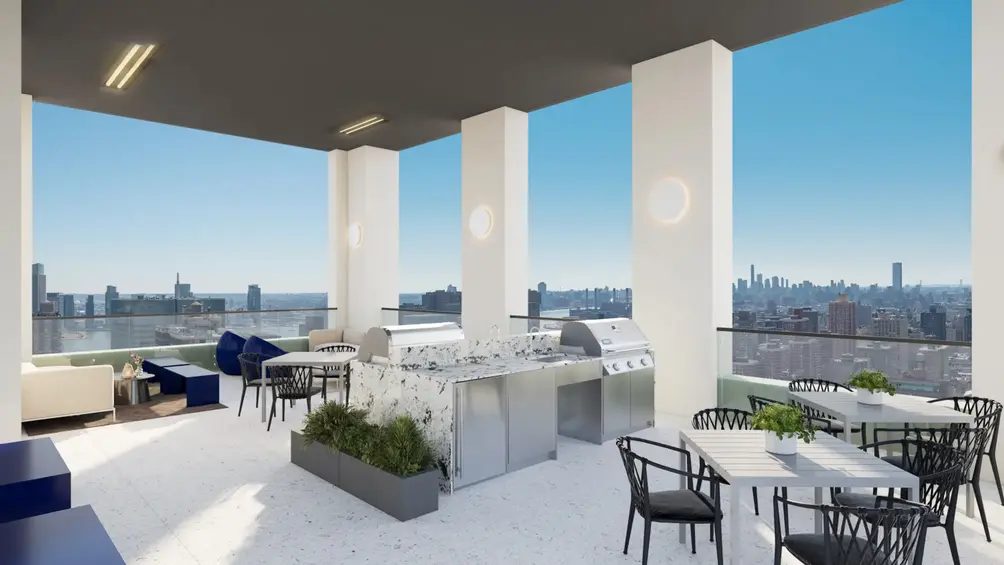
The Murray has launched leasing almost exactly at the point where Kips Bay gives way to Murray Hill. All interiors feature open floor plans, floor-to-ceiling windows, hardwood floors, LED lighting, sleek kitchens, and in-unit laundry. Select units have private terraces, and all residents enjoy access to amenities like a fitness center, golf simulator, lounge, and roof terrace with BBQ grills and skyline views.
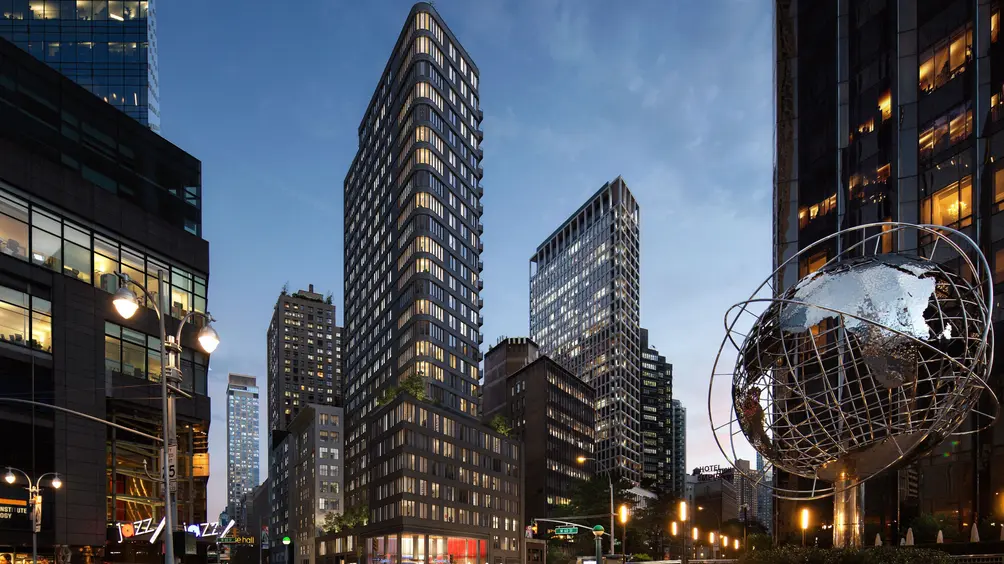 Anagram Columbus Circle (Rose Associates
Anagram Columbus Circle (Rose Associates

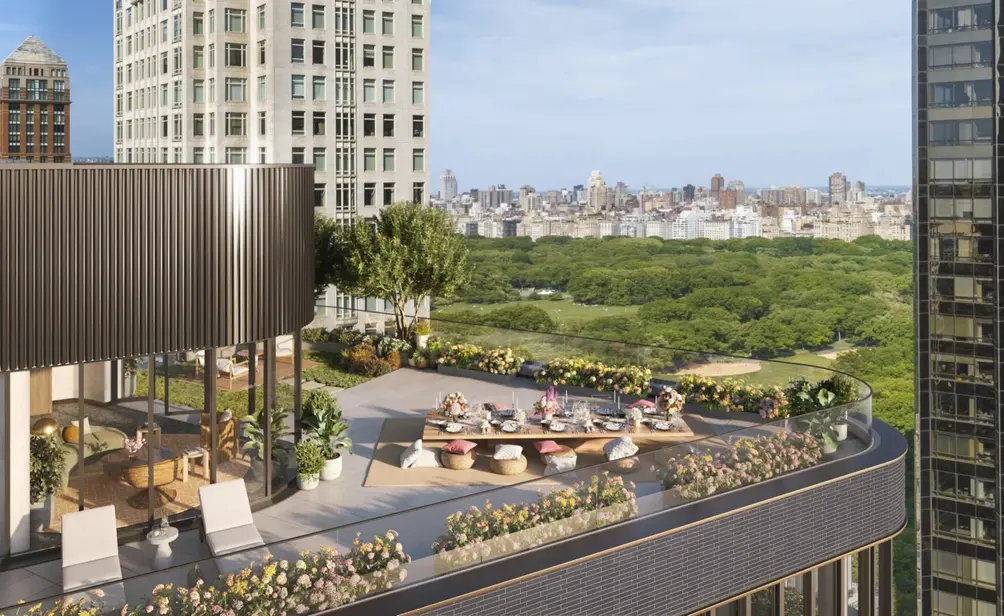
On the corner of Broadway and West 60th Street, Anagram Columbus Circle stands as a testament to Columbus Circle's meteoric rise in recent years. All units feature oversized windows with built-in blackout shades, wide-plank wood floors, kitchens with high-end finishes and appliances, baths with radiant heated floors, and in-unit laundry. The 13,000-square-foot amenity package is spread over four floors to include a fitness center, children’s and teen lounges, a music practice room, a co-working lounge with terrace access, and a penthouse lounge with outdoor terrace, to name but a few.
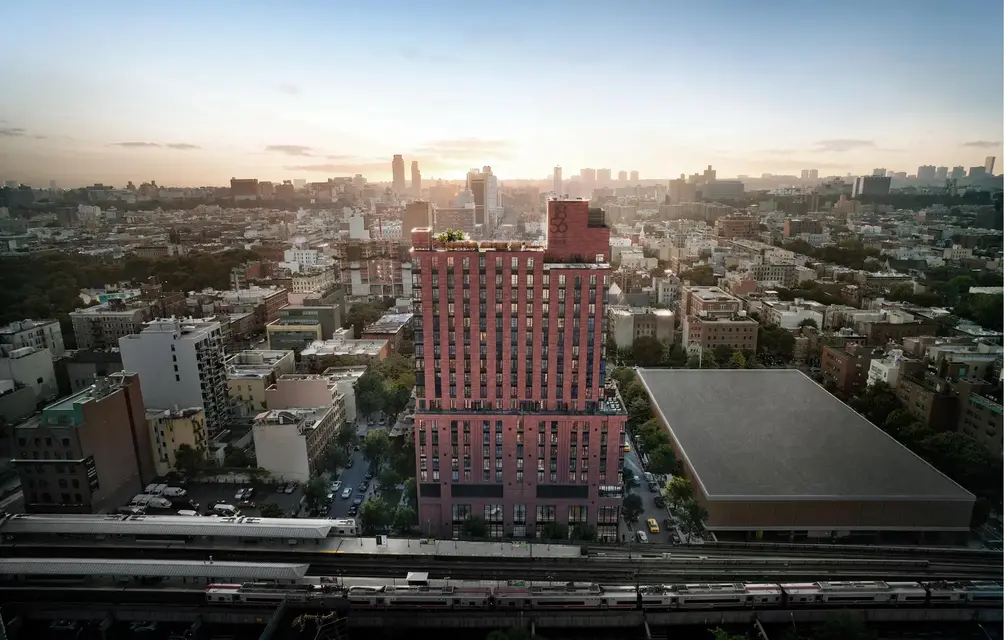 1856 Park Avenue (Douglas Elliman)
1856 Park Avenue (Douglas Elliman)
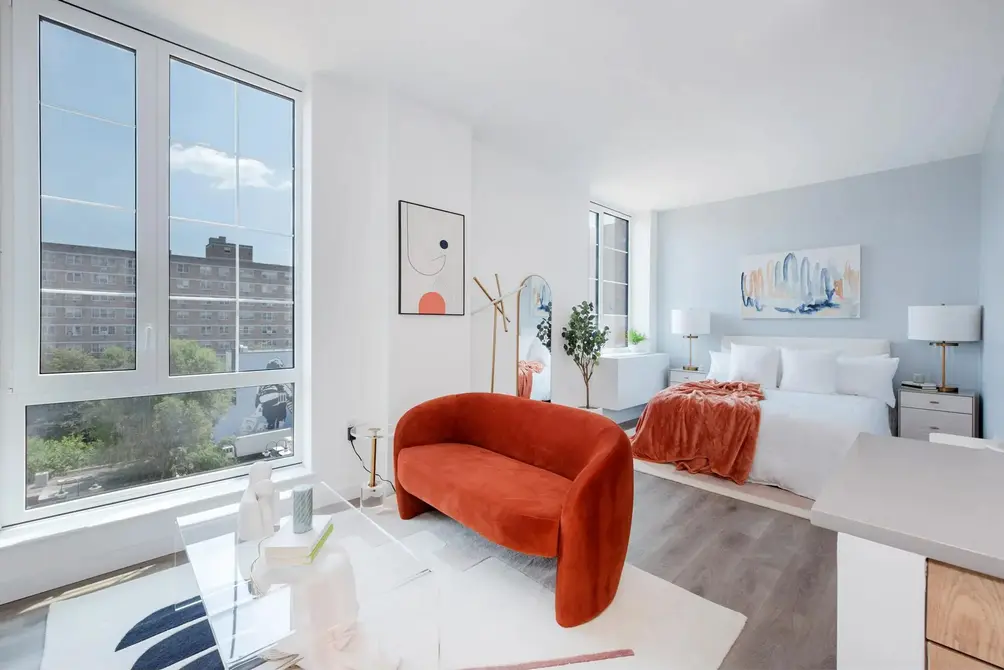

A few months after plans for the Second Avenue subway's extension to East Harlem were announced, leasing launched at 1856 Park Avenue. All units feature oversized windows, warm wood and chic stone finishes, custom closets, and in-unit washer/dryers. Amenities include a fitness center, a coworking lounge, a media lounge with outdoor terrace, and a rooftop lounge with grilling and lounging areas. The building is now offering free parking and one year of free storage.
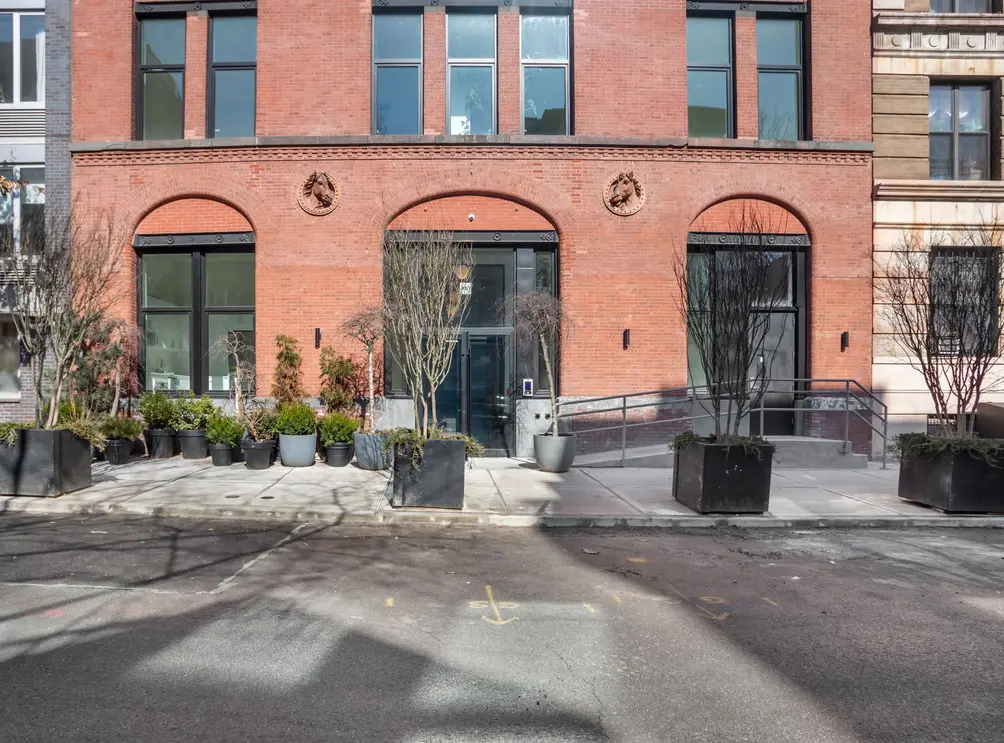 Carriage House Lofts (Bohemia Realty Group)
Carriage House Lofts (Bohemia Realty Group)

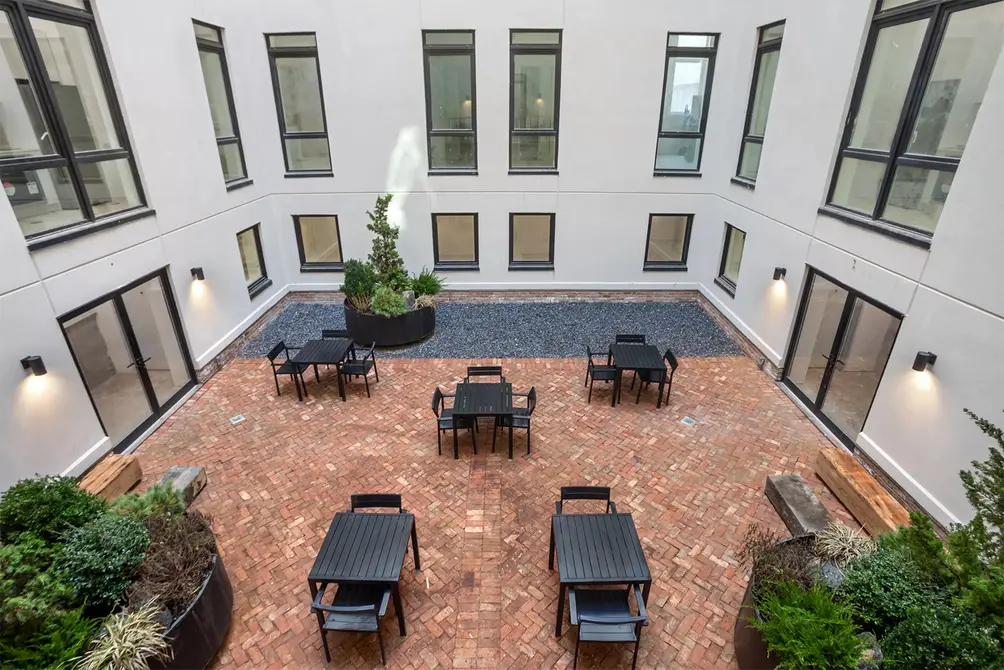
In the heart of Hamilton Heights, a 19th-century carriage house and stable has been converted to a modern rental, though not at the expense of the building's original architectural details. All units feature soaring ceilings, oversized windows, and stainless steel appliances. A courtyard at the center of the building offers cloistered outdoor space and a wonderful gathering spot.
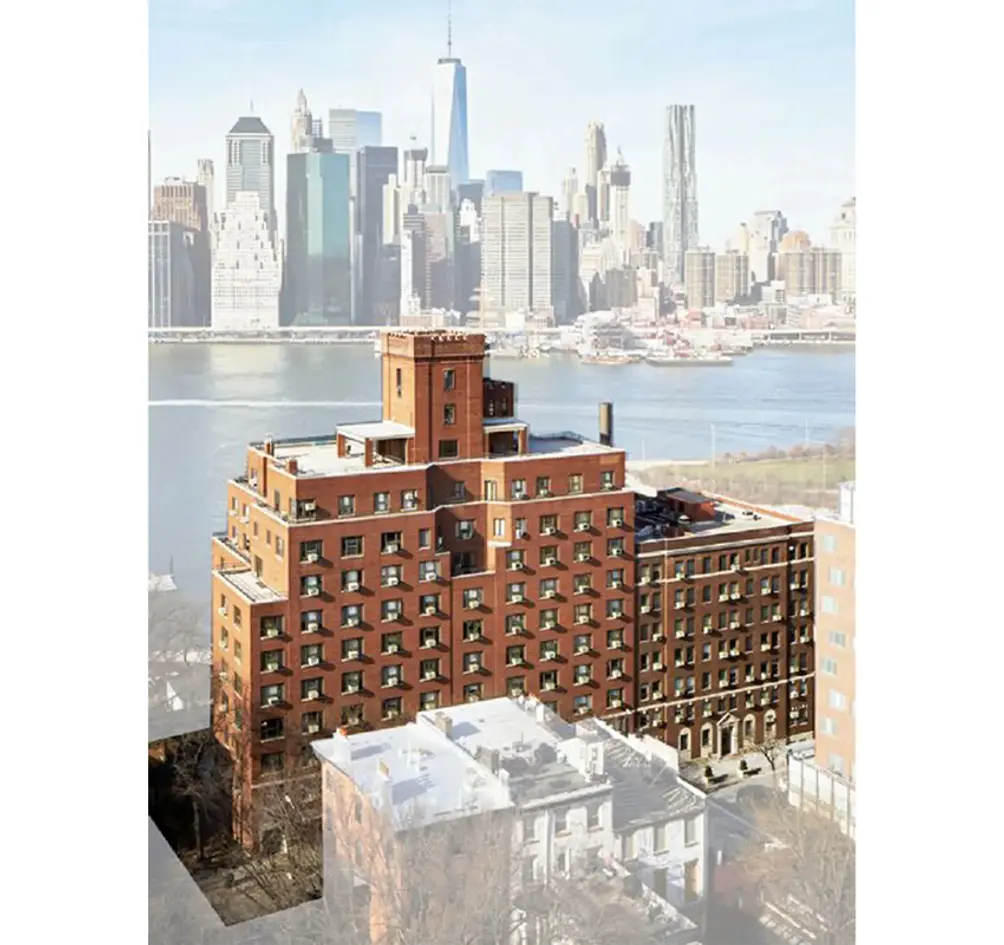 Torre House (Corcoran Group)
Torre House (Corcoran Group)
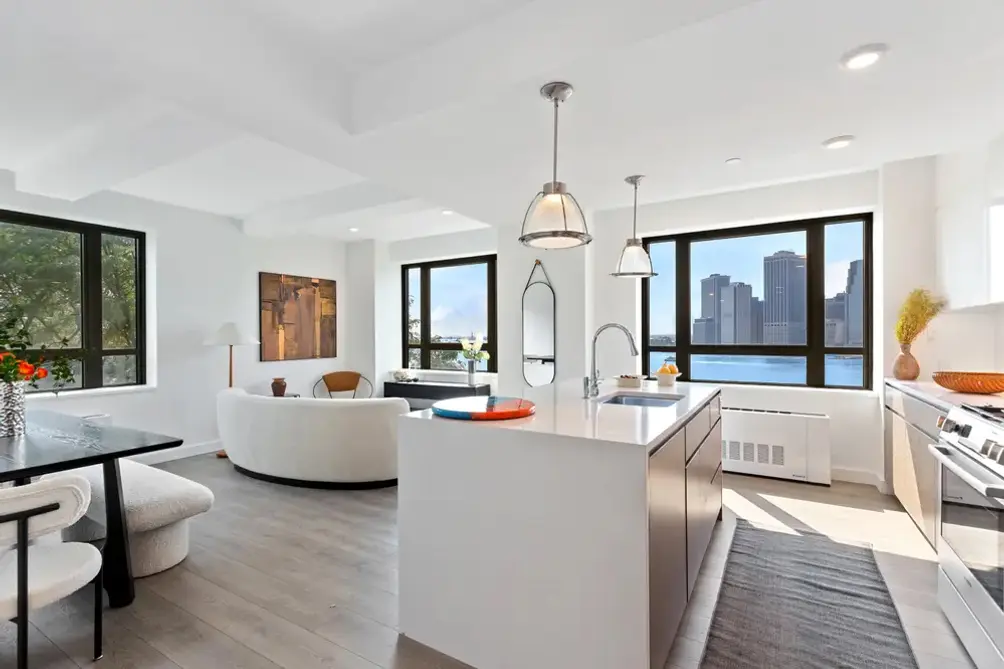
Just over Brooklyn Bridge Park, this building looks largely the same as when it was constructed in 1948. However, the interiors have been transformed into open-plan apartments with high-end finishes, state-of-the-art appliance packages, and in-unit laundry. Amenities include a fitness center, two swimming pools, a golf simulator, a coworking lounge, and a common roof deck with grilling areas and panoramic skyline views.
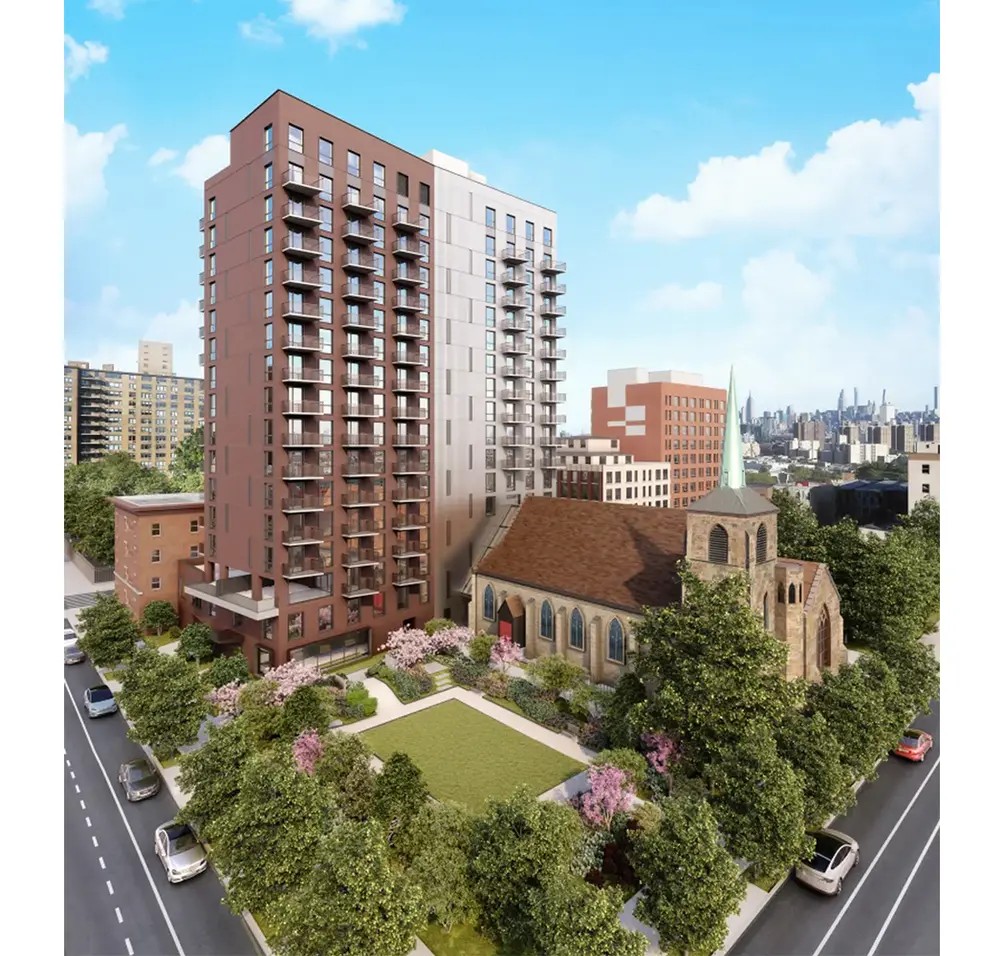 Parish House (Corcoran Group)
Parish House (Corcoran Group)
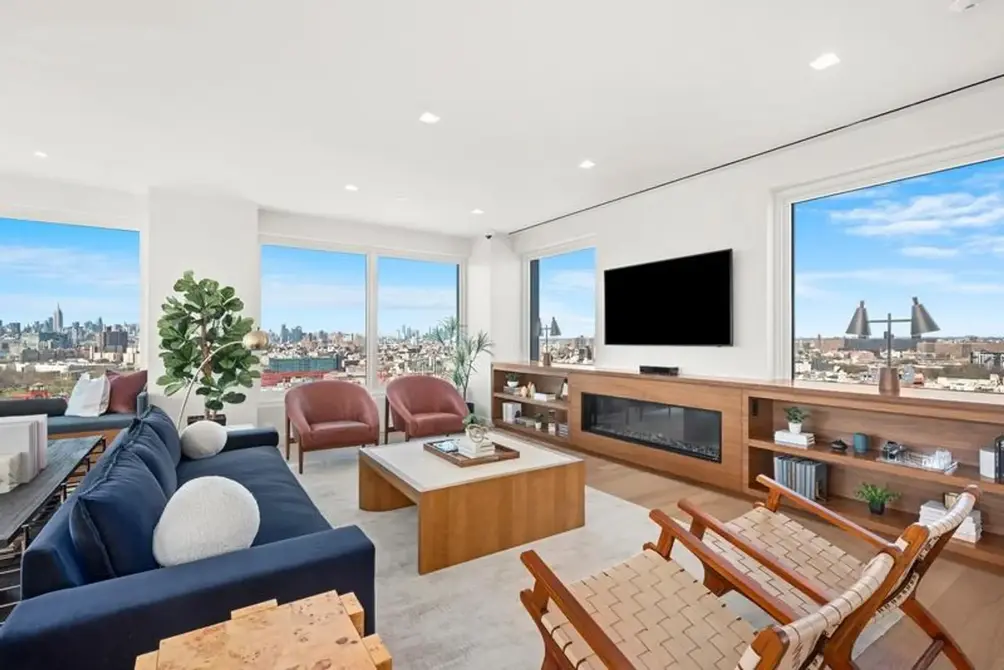
Located on the grounds of St. Mary's Church, Parish House looks out on views of historic architecture and the ever-changing Manhattan skyline alike. All units feature modern interiors, top-of-the-line stainless steel appliances, natural finishes, and in-unit washer/dryers. An impressive 20,000-square-foot amenity package includes an attended lobby, a package room, a gaming terrace, a coworking lounge, a fitness center, a party room, a rooftop terrace, a bike room, and on-site parking.
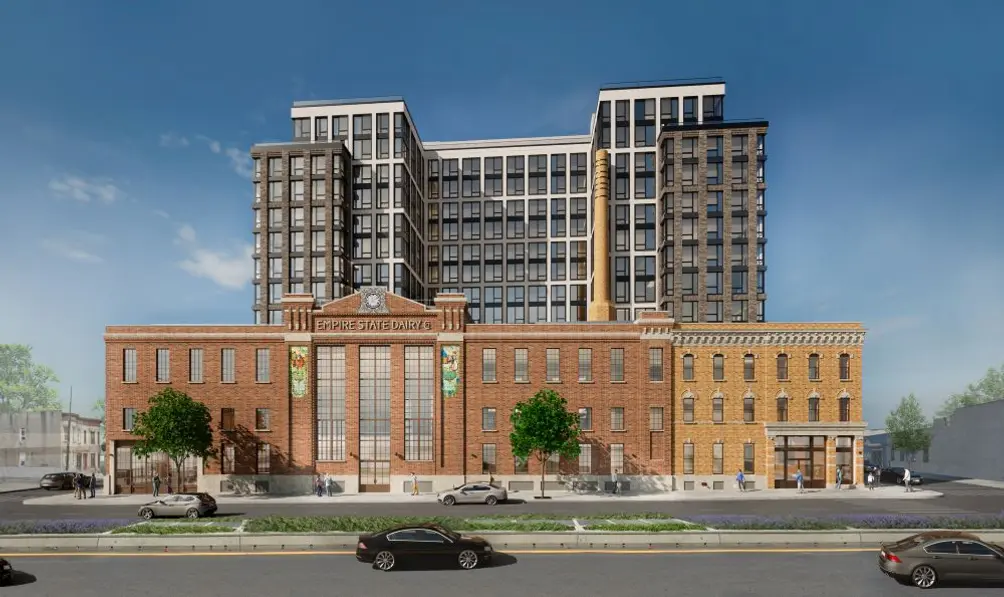 2840 Atlantic Avenue (MNS)
2840 Atlantic Avenue (MNS)


As The Highland shows, Brooklyn's residential building boom has made its way to the further reaches of the borough. The Van Siclen Avenue J/Z and C trains are well situated nearby, but amenities like a fitness center, business center, media lounge, children's playroom, and roof terrace may make leaving the building optional. The apartments are beautifully appointed with floor-to-ceiling windows, white oak flooring, modern kitchens, and serene baths.
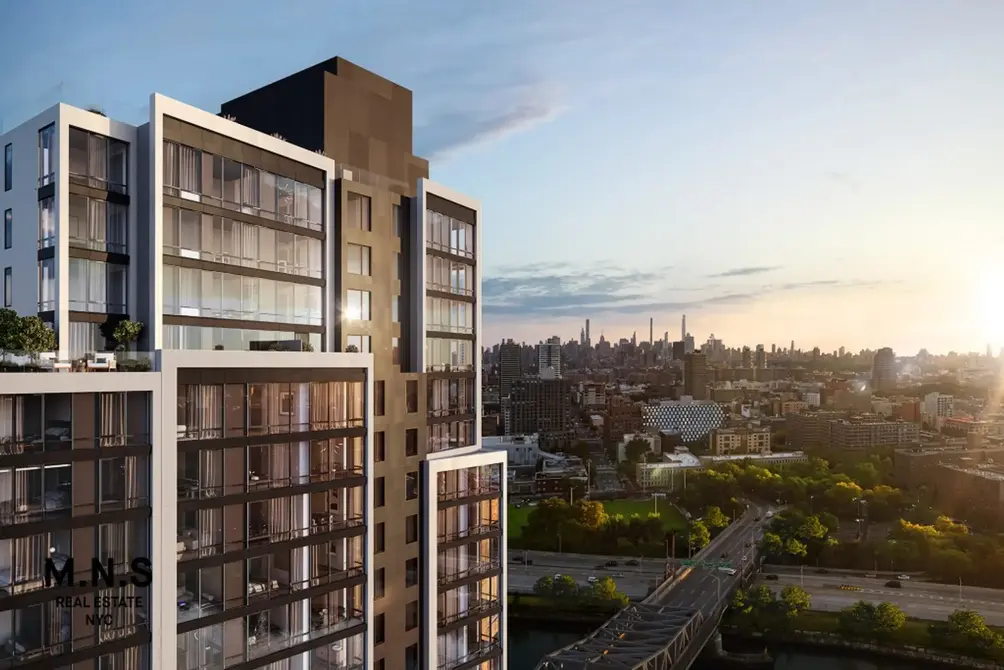 Maven (MNS)
Maven (MNS)

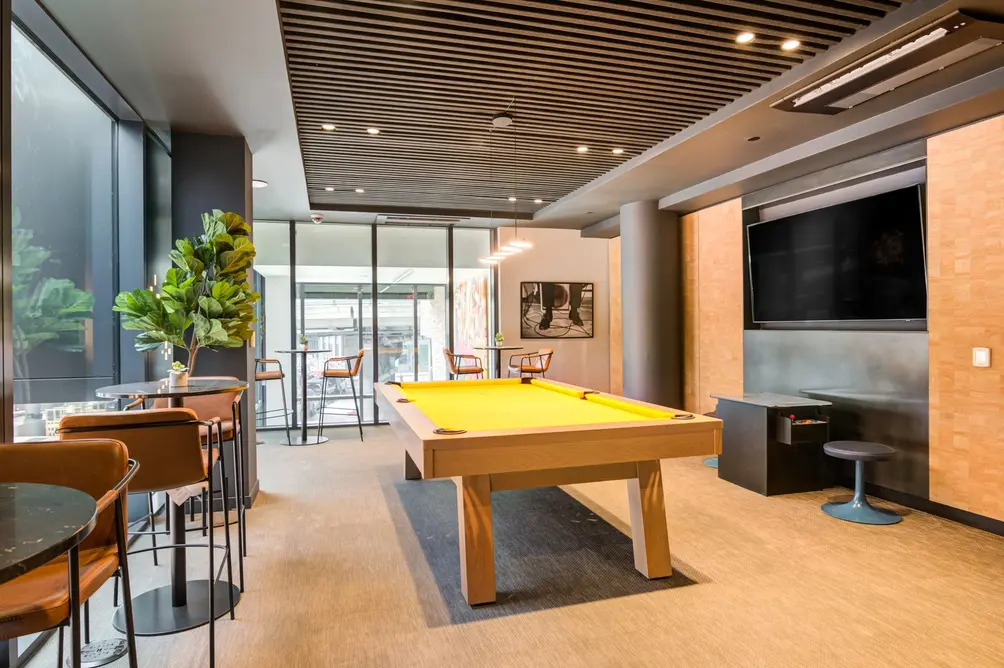
Only 20 minutes from Midtown, Maven brings an amenity-rich rental building to Mott Haven. All units feature modern interiors, sweeping city vistas, sophisticated finishes, stainless steel kitchen appliances, and in-unit washer/dryer. Residents arrive to an art-filled lobby, and additional amenities include concierge service, indoor and outdoor lounges, a fitness center, a pet spa, an event room, and a rooftop lounge.
The Brook Leasing
(718) 400-XXXX
{{error}}
More Rental Deals
- Leasing Updates View All
- Grand Opening View All
- Free Rent View All
-
Special Offers
-
Avalon Fort Greene offering discounts on select units; No-fee rentals from $2,845/month
-
Security Deposit Discounts at Beatrice Apartments in Chelsea; No Fee Rentals from $3,855/Month
-
East Harlem's The Heritage on Central Park: Renovated Rentals with Incentives from $2,595/Month
-

Contributing Writer
Cait Etherington
Cait Etherington has over twenty years of experience working as a journalist and communications consultant. Her articles and reviews have been published in newspapers and magazines across the United States and internationally. An experienced financial writer, Cait is committed to exposing the human side of stories about contemporary business, banking and workplace relations. She also enjoys writing about trends, lifestyles and real estate in New York City where she lives with her family in a cozy apartment on the twentieth floor of a Manhattan high rise.



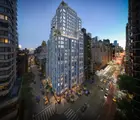

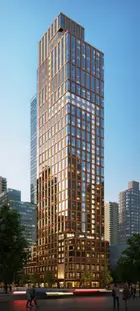










 6sqft delivers the latest on real estate, architecture, and design, straight from New York City.
6sqft delivers the latest on real estate, architecture, and design, straight from New York City.
